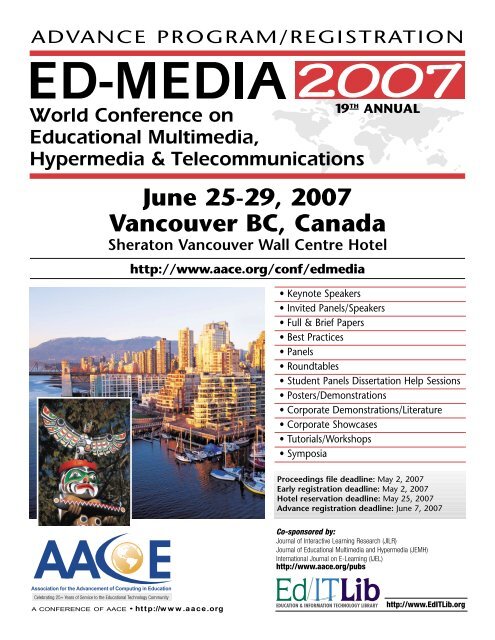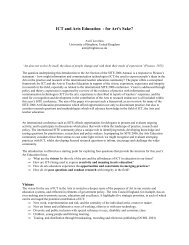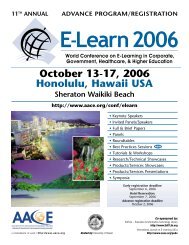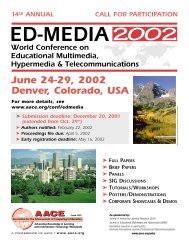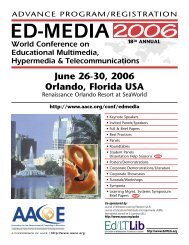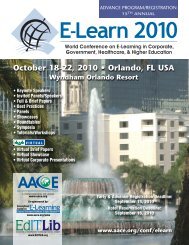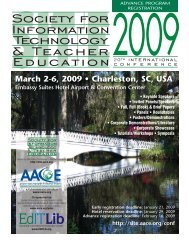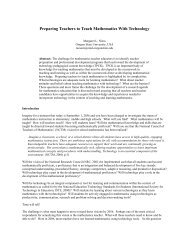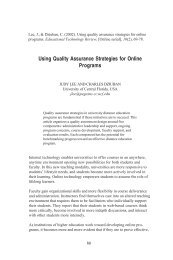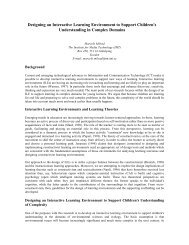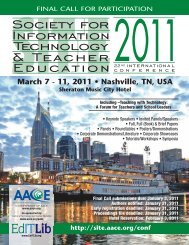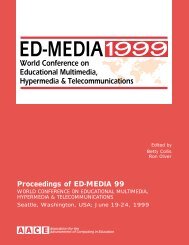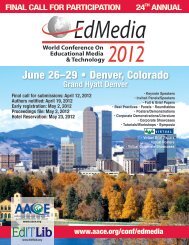June 25-29, 2007 Vancouver BC, Canada - Association for the ...
June 25-29, 2007 Vancouver BC, Canada - Association for the ...
June 25-29, 2007 Vancouver BC, Canada - Association for the ...
Create successful ePaper yourself
Turn your PDF publications into a flip-book with our unique Google optimized e-Paper software.
ADVANCE PROGRAM/REGISTRATION<br />
19 TH ANNUAL<br />
<strong>June</strong> <strong>25</strong>-<strong>29</strong>, <strong>2007</strong><br />
<strong>Vancouver</strong> <strong>BC</strong>, <strong>Canada</strong><br />
Sheraton <strong>Vancouver</strong> Wall Centre Hotel<br />
http://www.aace.org/conf/edmedia<br />
• Keynote Speakers<br />
• Invited Panels/Speakers<br />
• Full & Brief Papers<br />
• Best Practices<br />
• Panels<br />
• Roundtables<br />
• Student Panels Dissertation Help Sessions<br />
• Posters/Demonstrations<br />
• Corporate Demonstrations/Literature<br />
• Corporate Showcases<br />
• Tutorials/Workshops<br />
• Symposia<br />
Proceedings file deadline: May 2, <strong>2007</strong><br />
Early registration deadline: May 2, <strong>2007</strong><br />
Hotel reservation deadline: May <strong>25</strong>, <strong>2007</strong><br />
Advance registration deadline: <strong>June</strong> 7, <strong>2007</strong><br />
Co-sponsored by:<br />
Journal of Interactive Learning Research (JILR)<br />
Journal of Educational Multimedia and Hypermedia (JEMH)<br />
International Journal on E-Learning (IJEL)<br />
http://www.aace.org/pubs<br />
A CONFERENCE OF AACE • http://www.aace.org<br />
http://www.EdITLib.org
INVITATION<br />
ED-MEDIA <strong>2007</strong> – World Conference on Educational Multimedia,<br />
Hypermedia & Telecommunications is an international conference, organized by<br />
<strong>the</strong> <strong>Association</strong> <strong>for</strong> <strong>the</strong> Advancement of Computing in Education (AACE). This<br />
annual conference serves as a multi-disciplinary <strong>for</strong>um <strong>for</strong> <strong>the</strong> discussion and<br />
exchange of in<strong>for</strong>mation on <strong>the</strong> research, development, and applications on all<br />
topics related to multimedia, hypermedia and telecommunications/distance education.<br />
ED-MEDIA, <strong>the</strong> premiere international conference in <strong>the</strong> field, spans all<br />
disciplines and levels of education and annually attracts more than 1,500 leaders<br />
in <strong>the</strong> field from over 70 countries. For a list, see: Countries @ ED-MEDIA.<br />
We invite you to attend ED-MEDIA.<br />
Presentation Categories<br />
The Technical Program includes a wide range of interesting and useful activities<br />
designed to facilitate <strong>the</strong> exchange of ideas and in<strong>for</strong>mation.<br />
• Keynote & Invited Speakers • Student Panels Dissertation Help Sessions<br />
• Full & Brief Papers • Corporate Demonstrations/Literature<br />
• Best Practices<br />
• Corporate Showcases<br />
• Panels<br />
• Tutorials/Workshops<br />
• Roundtables<br />
• Symposia<br />
• Posters/Demonstrations<br />
Corporate Participation<br />
A variety of opportunities are available to present research-oriented papers, or<br />
to showcase and market your products and services. For in<strong>for</strong>mation about<br />
Corporate Showcases (30 minutes) and Corporate Demonstrations (2-hours,<br />
scheduled with <strong>the</strong> Poster/Demos). See: http://www.aace.org/conf/edmedia/corporate.htm<br />
Proceedings<br />
Accepted papers will be published in <strong>the</strong> Proceedings (book and CD-ROM <strong>for</strong>mats)<br />
as well as in <strong>the</strong> AACE Digital Library. These proceedings serve as major<br />
sources in <strong>the</strong> multimedia/ hypermedia/telecommunications community,<br />
reflecting <strong>the</strong> current state of <strong>the</strong> art in <strong>the</strong> discipline. In addition, <strong>the</strong><br />
Proceedings also are internationally available and distributed via <strong>the</strong> online<br />
EdITLib - Education & In<strong>for</strong>mation Technology Library, sponsored by AACE.<br />
(http://www.editlib.org/). The Proceedings also will be available as a searchable<br />
electronic book on CD-ROM (Macintosh, IBM, and ISO 9660 <strong>for</strong>mats) and<br />
included in each conference registrant's packet. And <strong>the</strong> Proceedings may be<br />
purchased in hard copy book <strong>for</strong>m prior to <strong>the</strong> conference. Selected papers<br />
may be invited <strong>for</strong> publication in AACE’s respected journals especially in <strong>the</strong><br />
Journal of Educational Multimedia and Hypermedia (JEMH), International<br />
Journal on E-Learning (IJEL), or Journal of Interactive Learning Research<br />
(JILR). See: http://www.aace.org/pubs<br />
Paper Awards<br />
Papers present reports of significant work or integrative reviews in research,<br />
development, and applications related to <strong>the</strong> educational multimedia, hypermedia<br />
and telecommunications/distance education. All presented papers will be<br />
considered by <strong>the</strong> Program Committee <strong>for</strong> Outstanding Paper Awards. There will<br />
also be an award <strong>for</strong> Outstanding Student Paper (<strong>the</strong>re<strong>for</strong>e, please indicate with<br />
your submission if <strong>the</strong> primary author is a full-time student). Award winning<br />
papers will be highlighted in <strong>the</strong> AACE online periodical <strong>the</strong> AACE Journal.<br />
Background<br />
The ED-MEDIA conference series originated as <strong>the</strong> International Conference<br />
on Computers and Learning (ICCAL) which was held as a major international<br />
symposium in Calgary, <strong>Canada</strong> (1987); Dallas, USA (1989); Hagen, Germany<br />
(1990); and Wolfville, <strong>Canada</strong> (1992). ED-MEDIA conferences have been held<br />
in Orlando, USA (1993); <strong>Vancouver</strong>, <strong>Canada</strong> (1994); Graz, Austria (1995);<br />
Boston, USA (1996); Calgary, <strong>Canada</strong> (1997); Freiburg, Germany (1998),<br />
Seattle, USA (1999), Montreal, <strong>Canada</strong> (2000), Tampere, Finland (2001),<br />
Denver, USA (2002), Honolulu, Hawaii, USA (2003), Lugano, Switzerland<br />
(2004), Montreal, <strong>Canada</strong> (2005), and Orlando, USA (2006). ED-MEDIA <strong>2007</strong><br />
is <strong>the</strong> 19 th in this series of internationally respected meetings.<br />
ED-MEDIA <strong>2007</strong> Topics<br />
The scope of <strong>the</strong> conference includes, but is not limited to, <strong>the</strong> following<br />
major topics as <strong>the</strong>y relate to <strong>the</strong> educational and developmental aspects<br />
of multimedia/hypermedia and telecommunications:<br />
Infrastructure<br />
Architectures <strong>for</strong> Educational Technology Systems<br />
Design of Distance Learning Systems<br />
Distributed Learning Environments<br />
Methodologies <strong>for</strong> System Design<br />
Multimedia/Hypermedia Systems<br />
WWW-based Course-Support Systems<br />
Tools & Content-oriented Applications<br />
Agents<br />
Authoring Tools<br />
Evaluation of Impact<br />
Groupware Tools<br />
Interactive Learning Environments<br />
Multimedia/Hypermedia Applications<br />
Research Perspectives<br />
Virtual Reality<br />
WWW-based Course Sites & Learning Resources<br />
New Roles of <strong>the</strong> Instructor & Learner<br />
Constructivist Perspectives<br />
Cooperative/Collaborative Learning<br />
Implementation Experiences<br />
Improving Classroom Teaching<br />
Instructor Networking<br />
Instructor Training and Support<br />
Pedagogical Issues<br />
Teaching/Learning Strategies<br />
Human-Computer Interaction (HCI/CHI)<br />
Computer-Mediated Communication<br />
Design Principles<br />
Usability/User Studies<br />
User Interface Design<br />
Cases & Projects<br />
Country-Specific Developments<br />
Exemplary Projects<br />
Institution-Specific Cases<br />
Virtual Universities<br />
Universal Web Accessibility<br />
This topic strand provides in<strong>for</strong>mation to help adhere to laws, regulations and guidelines<br />
to make electronic accessibility available to those with physical challenges.<br />
Emerging Technologies & Accessibility<br />
Infrastructure, Technology & Techniques<br />
International Challenges<br />
New Roles <strong>for</strong> Teachers/Learners<br />
O<strong>the</strong>r: Research, Library Issues, etc<br />
Policy and Law<br />
Site Management Considerations<br />
Indigenous Peoples & Technology<br />
This topic provides in<strong>for</strong>mation on <strong>the</strong> issues and applications related to indigenous<br />
peoples and technology. Submissions are invited on <strong>the</strong> following non-exclusive<br />
list of topics.<br />
The Internet's Effects on Linguistic Diversity<br />
Promoting Indigenous Language Development via Discussion & Chat<br />
Multimedia Support of Language & Culture<br />
Exploring Language with Digital Resources<br />
Cultural Attitudes and Technology Acceptance<br />
Modifying Computers to meet Minority Language Requirements<br />
Oral Tradition Meets Voice Dictation<br />
Voice Over IP, Net Meetings and Collaborative Thinking<br />
Asynchronous, Reflective Discourse<br />
Online Dctionaries and Language Development<br />
2
Overview<br />
MONDAY, JUNE <strong>25</strong><br />
Registration..................................................................7:30 AM-7:30 PM<br />
Tutorials/Workshops .....................................................8:30 AM-12 NOON<br />
Beverage Break ............................................................10:00-10:15 AM<br />
Lunch Break ................................................................12 NOON-1:30 PM<br />
Tutorials/Workshops ..........................................................1:30-5:00 PM<br />
Beverage Break ................................................................3:00-3:15 PM<br />
Newcomer Welcome .........................................................5:30-6:00 PM<br />
Social Event: Welcome Reception.......................................6:00-7:00 PM<br />
TUESDAY, JUNE 26<br />
Registration..................................................................8:00 AM-5:00 PM<br />
Welcome & Opening General Session (Keynote)..................8:30-9:30 AM<br />
Beverage Break ..............................................................9:30-10:00 AM<br />
Newcomer Welcome........................................................9:30-10:00 AM<br />
Morning Sessions.....................................................10:00 AM-12:15 PM<br />
Lunch Break ...................................................................12:15-1:30 PM<br />
Afternoon Sessions ...........................................................1:30-5:00 PM<br />
Beverage Break ................................................................2:30-2:45 PM<br />
WEDNESDAY, JUNE 27<br />
Registration..................................................................8:00 AM-5:00 PM<br />
General Session (Keynote & Paper Awards) ........................8:30-9:30 AM<br />
Beverage Break ..............................................................9:30-10:00 AM<br />
Morning Sessions.....................................................10:00 AM-12:15 PM<br />
Lunch Break ...................................................................12:15-1:30 PM<br />
Social Event: Topic Discussion Lunch ...............................12:30-1:30 PM<br />
Afternoon Sessions ...........................................................1:30-5:00 PM<br />
Beverage Break ................................................................2:30-2:45 PM<br />
Poster/Demonstrations ......................................................5:15-7:15 PM<br />
THURSDAY, JUNE 28<br />
Registration..................................................................8:00 AM-5:00 PM<br />
General Session (Keynote) .................................................8:30-9:30 AM<br />
Beverage Break ..............................................................9:30-10:00 AM<br />
Morning Sessions.....................................................10:00 AM-12:15 PM<br />
Lunch Break ..................................................................12:15-1:30 PM<br />
Afternoon Sessions ...........................................................1:30-5:00 PM<br />
Beverage Break ................................................................2:30-2:45 PM<br />
Special Event: TBA ............................................................6:00-8:00 PM<br />
ED-MEDIA <strong>2007</strong> SOCIAL EVENTS<br />
MONDAY, JUNE <strong>25</strong><br />
Welcome Reception<br />
6:00-7:00 PM<br />
All attendees welcome!<br />
MONDAY, JUNE <strong>25</strong> & TUESDAY, JUNE 26<br />
Newcomer Receptions<br />
Monday, <strong>June</strong> <strong>25</strong> • 5:30-6:00 PM<br />
Tuesday, <strong>June</strong> 26 • 9:30-10:00 AM<br />
All attendees welcome!<br />
WEDNESDAY, JUNE 27<br />
Topic Discussion Luncheon<br />
12:30-1:30 PM<br />
Join colleagues <strong>for</strong> a networking luncheon to discuss various topics<br />
selected from <strong>the</strong> conference topics (see page 2 <strong>for</strong> list of topics). A specific<br />
topic will be designated at each table and you will have <strong>the</strong> opportunity<br />
to create your own topics at <strong>the</strong> lunch. Make your reservations now as<br />
tickets are limited. If you have already registered, you may add <strong>the</strong> lunch<br />
at <strong>the</strong> conference registration desk. Cost: $<strong>25</strong><br />
FRIDAY, JUNE 30<br />
Reception & Invitation to ED-MEDIA 2008<br />
in Vienna, Austria!<br />
5:00-5:30 PM<br />
FRIDAY, JUNE <strong>29</strong><br />
Registration..................................................................8:00 AM-5:00 PM<br />
General Session (Keynote) .................................................8:30-9:30 AM<br />
Beverage Break ..............................................................9:30-10:00 AM<br />
Morning Sessions.....................................................10:00 AM-12:15 PM<br />
Lunch Break ...................................................................12:15-1:30 PM<br />
Afternoon Sessions ...........................................................1:30-5:00 PM<br />
Reception & Invitation to ED-MEDIA 2008 in Vienna, Austria! ......5:00-5:30 PM<br />
3
KEYNOTE SPEAKERS<br />
Tuesday, <strong>June</strong> 26, 8:30 AM<br />
Is Web 2.0 <strong>the</strong> Future of <strong>the</strong> Web?<br />
Bebo White<br />
Stan<strong>for</strong>d University, USA<br />
Wednesday, <strong>June</strong> 27, 8:30 AM<br />
Teaching and Learning in Networked World<br />
Terry Anderson<br />
Athabasca University, <strong>Canada</strong><br />
Thursday, <strong>June</strong> 28, 8:30 AM<br />
Working Smarter to Maximise Returns<br />
From Educational Technologies<br />
Ron Oliver<br />
Edith Cowan University, Australia<br />
INVITED SPEAKERS<br />
Partial List<br />
Tuesday, <strong>June</strong> 26, 11:15 AM<br />
Let’s Get Real: The University Without Walls and Au<strong>the</strong>ntic<br />
Learning Experiences<br />
Tony Koppi, Univ. of New South Wales, Sydney, Australia<br />
Tuesday, <strong>June</strong> 26, 1:30 PM<br />
School Motivation among Elementary and High School Students:<br />
The Foundation <strong>for</strong> Students’ Academic success<br />
Frédéric Guay, Univ. Laval, <strong>Canada</strong><br />
Wednesday, <strong>June</strong> 27, 1:30 PM<br />
Teaching and Assessing What Undergraduates Really Need to Learn:<br />
Technology and <strong>the</strong> Conative Domain<br />
Thomas C. Reeves, The Univ. of Georgia, USA<br />
Thursday, <strong>June</strong> 28, 1:30 AM<br />
Generating New Learning Contexts: Novel Forms of Reuse and<br />
Learning on <strong>the</strong> Move<br />
John Cook, London Metropolitan Univ., UK<br />
Thursday, <strong>June</strong> 28, 4:00 PM<br />
Holy Cow, Ed Tech is Finally Mainstream: What Do We Do Now?<br />
Cathie Norris, Univ. of North Texas, USA; Elliot Soloway, Univ. of Michigan, USA<br />
Friday, <strong>June</strong> <strong>29</strong>, 11:15 AM<br />
Mind <strong>the</strong> Gap: Bridging <strong>the</strong> Home School Divide through Contextualized<br />
Activities and Personalized Mobile Technology<br />
Rose Luckin, Univ. of London, UK<br />
Friday, <strong>June</strong> <strong>29</strong>, 8:30 AM<br />
Challenging or Con<strong>for</strong>ming: The Art of<br />
Blended E-Learning<br />
Allison Littlejohn<br />
Chair of Learning Technology, Director, Caledonian<br />
Academy, Glasgow Caledonian University, UK<br />
Education & In<strong>for</strong>mation Technology Library<br />
Please<br />
Recommend Your<br />
Library Subscribe!<br />
http://www.EdITLib.org<br />
• Conduct scholarly research • Receive Table of Contents alerts • Keep current on <strong>the</strong> latest research and publications in your field<br />
The EdITLib is your source <strong>for</strong> 5+ years of peer-reviewed and published articles and papers on <strong>the</strong> latest<br />
research,developments, and applications related to all aspects of Educational Technology and E-Learning.<br />
Journals – http://www.aace.org/pubs<br />
International Journal on E-Learning<br />
(Corporate, Government, Healthcare, & Higher Education)<br />
Journal of Computers in Ma<strong>the</strong>matics and Science Teaching<br />
Journal of Educational Multimedia and Hypermedia<br />
Journal of Interactive Learning Research<br />
Journal of Technology and Teacher Education<br />
AACE Journal (electronic)<br />
Contemporary Issues in Technology & Teacher Education (electronic)<br />
Conferences – http://www.aace.org/conf<br />
ED-MEDIA – World Conference on Educational Multimedia, Hypermedia<br />
& Telecommunications<br />
E-Learn – World Conference on E-Learning in Corporate,Healthcare,<br />
Government, and Higher Education<br />
SITE – Society <strong>for</strong> In<strong>for</strong>mation Technology and Teacher Education<br />
International Conference<br />
and o<strong>the</strong>rs...<br />
Sponsored by AACE: info@aace.org • 757-366-5606<br />
4
PRE-CONFERENCE TUTORIALS & WORKSHOPS<br />
Monday, <strong>June</strong> <strong>25</strong>, Morning, 8:30 AM – 12:00 NOON<br />
T1: Exploring Design-Based Research Methods<br />
Ron Oliver, Edith Cowan University, Australia<br />
Jan Herrington, University of Wollongong, Australia<br />
Tom Reeves, University of Georgia, USA<br />
Abstract<br />
This tutorial has been designed to help participants understand and be able to apply<br />
design-based research (DBR) approaches to explorations and inquiries into technology-supported<br />
learning and teaching. Design-based research comprises various<br />
approaches undertaken with <strong>the</strong> intent of producing new <strong>the</strong>ories, artifacts, and practices<br />
that account <strong>for</strong>, and potentially impact, learning and teaching in naturalistic settings.<br />
Design-based research provides a sound basis <strong>for</strong> meaningful and effective<br />
research that can deliver outcomes and findings which will have value and impact.<br />
Objectives<br />
Participation in this workshop will enable participants to:<br />
• understand <strong>the</strong> conceptual basis underpinning DBR approaches;<br />
• appreciate <strong>the</strong> <strong>for</strong>ms of inquiry suited to DBR approaches;<br />
• know <strong>the</strong> important steps and processes in DBR approache;<br />
• understand <strong>the</strong> processes associated with planning a DBR project;<br />
• plan a research project using a DBR approach;<br />
• evaluate DBR approaches and understand <strong>the</strong>ir potential to support quality<br />
research outoomes.<br />
Outline<br />
The workshop will follow <strong>the</strong> following <strong>for</strong>mat:<br />
• discussion and description of DBR as a research methodology (presentation).<br />
The presenters will provide an overview of DBR from a conceptual perspective<br />
highlighting <strong>the</strong> characteristic attributes and <strong>the</strong> principles underpinning<br />
<strong>the</strong> approach. The introduction will provide examples of <strong>the</strong> <strong>for</strong>ms of research<br />
suited to DBR approaches and <strong>the</strong> outcomes that can be achieved.<br />
• reviewing case studies of DBR projects (groupwork). Participants will work in<br />
small groups to review examples of DBR and to analyse <strong>the</strong> opporunties<br />
derived from <strong>the</strong> approaches employed. The review will seek to discern <strong>the</strong><br />
critical elements of DBR and <strong>the</strong> opportunities <strong>the</strong>y present to <strong>the</strong> researcher.<br />
• conceptualising a DBR approach (presentation). The presenters will describe<br />
<strong>the</strong> processes associated with planning and developing a DBR project. The<br />
presentation will highlight <strong>the</strong> critical decisions and judgments that guide <strong>the</strong><br />
planning and implementation of DBR.<br />
• planning a DBR project (groupwork). Participants will work in homogeneous<br />
groups to create plans <strong>for</strong> DBR projects based on personal interests and<br />
experience. The process is intended to develop participants' skills in applying<br />
DBR approaches in a grounded fashion.<br />
Prerequisites<br />
Audience need to have some experience in research into learning technologies ei<strong>the</strong>r<br />
as students, supervisors or academics. The workshop will assume an understanding<br />
of qualitative and/or quantitative research methodologies and previous experience in<br />
conducting research into technology-supported learning using <strong>the</strong>se methods.<br />
Intended Experience Level<br />
Beginner<br />
Instructor Qualifications<br />
Thomas C. Reeves is a Professor of Instructional Technology at The University of<br />
Georgia in <strong>the</strong> USA. Jan Herrington is an Associate Professor of Education at <strong>the</strong><br />
University of Wollongong in Australia. Ron Oliver is a Professor of Interactive<br />
Multimedia and an Associate Dean of Teaching and Learning at Edith Cowan<br />
University in Australia. Our research collaboration has been partially funded by <strong>the</strong><br />
Australian Research Council, <strong>the</strong> Australian-American Fulbright Commission, and our<br />
respective universities.<br />
Tutorials are indicated by a T# and have a lecture/demonstration <strong>for</strong>mat. Workshops are indicated by a W# and are primarily hands-on sessions.<br />
We advise early registration <strong>for</strong> all Tutorials and Workshops due to limited space available.<br />
5
PRE-CONFERENCE TUTORIALS & WORKSHOPS<br />
Monday, <strong>June</strong> <strong>25</strong>, Morning, 8:30 AM – 12:00 NOON<br />
T2: Quick Start to E-Learning<br />
Edgar R. Weippl, Vienna University of Technology, Austria<br />
Abstract<br />
The goal of this tutorial is to give participants all <strong>the</strong>y need to quickly get started<br />
with e-learning. The focus is on organizing courses (course management) and NOT<br />
on content creation. In <strong>the</strong> first part of <strong>the</strong> tutorial <strong>the</strong>y learn everything <strong>the</strong>y need<br />
to set up <strong>the</strong>ir first courses <strong>for</strong> a small department using Moodle. The second part<br />
presents a light-weight approach of <strong>the</strong> project management necessary to introduce<br />
an e-learning plat<strong>for</strong>m at a larger scale.<br />
Objectives<br />
Benefits <strong>for</strong> Participants<br />
• Hands-on experience how to set-up Moodle on a Microsoft Windows system.<br />
• Ready-to-use templates <strong>for</strong> <strong>the</strong> project management when introducing larger-scale<br />
e-learning solution<br />
Resources<br />
After <strong>the</strong> conference participants will have access to a recording of how to per<strong>for</strong>m<br />
<strong>the</strong> installation and links to <strong>the</strong> appropriate downloads. In addition template documents<br />
will be available that participants can use when managing projects.<br />
Outline<br />
First Part<br />
• Introduction to Moodle<br />
• System Requirements<br />
• Installation of a Web Server, database, and Moodle (Demo or Hands-on),<br />
• First steps in Moodle: Setting up courses, assigning lecturers, using<br />
resources and simple <strong>for</strong>ms of grading students. (Demo or Hands-on)<br />
• Advanced teaching concepts and <strong>the</strong> constructivist approach of Moodle.<br />
Second Part<br />
• Vision Document<br />
• Choosing a plat<strong>for</strong>m and how to convince people (requirements analysis and<br />
evaluation) - Prototype installations<br />
• Planning <strong>the</strong> implementation<br />
• Possible options of introducing Moodle at a large university where many o<strong>the</strong>r<br />
smaller legacy plat<strong>for</strong>ms exists.<br />
Prerequisites<br />
Lecturers that need to quickly set up a personal e-learning plat<strong>for</strong>m <strong>for</strong> <strong>the</strong>mselves or<br />
<strong>for</strong> few coworkers. (Part 1 of <strong>the</strong> tutorial) Inexperienced project managers or lecturers<br />
that have never managed large-scale implementation projects (Part 2 of <strong>the</strong> tutorial)<br />
Intended Experience Level<br />
Beginner<br />
Instructor Qualifications<br />
Dr. Edgar R. Weippl is assistant professor at <strong>the</strong> Vienna University of Technology and<br />
CEO of Security Research. His research focuses on applied concepts of IT-security<br />
and e-learning. Edgar has taught several tutorials on security issues in e-learning at<br />
international conferences, including ED-MEDIA 2003-2006 and E-Learn 2005. In<br />
2005, he published Security in E-Learning with Springer. After graduating with a<br />
Ph.D. from <strong>the</strong> Vienna University of Technology, Edgar worked <strong>for</strong> two years in a<br />
research startup. He <strong>the</strong>n spent one year teaching as an assistant professor at Beloit<br />
College, WI. From 2002 to 2004, while with <strong>the</strong> software vendor ISIS Papyrus, he<br />
worked as a consultant <strong>for</strong> an HMO (Empire BlueCross BlueShield) in New York, NY<br />
and Albany, NY, and <strong>for</strong> Deutsche Bank (PWM) in Frankfurt, Germany. An extended<br />
CV including all publications is available at www.ifs.tuwien.ac.at/~weippl.<br />
Tutorials are indicated by a T# and have a lecture/demonstration <strong>for</strong>mat. Workshops are indicated by a W# and are primarily hands-on sessions.<br />
We advise early registration <strong>for</strong> all Tutorials and Workshops due to limited space available.<br />
6
PRE-CONFERENCE TUTORIALS & WORKSHOPS<br />
Monday, <strong>June</strong> <strong>25</strong>, Morning, 8:30 AM – 12:00 NOON<br />
W1: Pervasive Gaming and Experiential Learning (bring your laptop)<br />
Robert Biddle & Claire Dormann, Carleton University, <strong>Canada</strong><br />
Abstract<br />
This workshop will introduce a new geo-pervasive game that uses active learning<br />
and is suitable <strong>for</strong> many learning contexts. The game has two phases, one to<br />
explore and one to tell stories. The first phase involves exploration of an environment<br />
in small teams, using a set of cards to guide exploration in new ways and<br />
focus attention on multi-modal interaction. The second phase involves stories<br />
recorded in a community "wiki": a website that thus grows to be a kind of community<br />
atlas of <strong>the</strong> environment. The workshop will first introduce <strong>the</strong> <strong>the</strong>ory of this<br />
kind of pervasive game, and describe our experience with <strong>the</strong> game in various<br />
learning environments. We will <strong>the</strong>n play <strong>the</strong> game ourselves, using teams and our<br />
cards to explore <strong>the</strong> environment, and <strong>the</strong>n collaborate to create an emergent atlas.<br />
Finally, we will work in small groups to brainstorm how <strong>the</strong> game could be applied<br />
to learning subjects and environments of interest to those in <strong>the</strong> workshop.<br />
Objectives<br />
1. To Explain <strong>the</strong> Theory and Benefits of Pervasive Games in Learning. We will<br />
review <strong>the</strong> idea of pervasive games, give some examples from <strong>the</strong> literature, and<br />
show <strong>the</strong> connection to experiential learning.<br />
2. To Learn and Experience a Pervasive Game First-Hand. We will introduce our<br />
adaptable pervasive game, facilitate play-testing of <strong>the</strong> game, and <strong>the</strong> creation<br />
of a community wiki atlas. After this experience, participants will be able to play<br />
<strong>the</strong> game in <strong>the</strong>ir teaching environments, as no special material is needed o<strong>the</strong>r<br />
than <strong>the</strong> cards and access to one of <strong>the</strong> many free wiki websites.<br />
3. To Explore How To Adapt a Pervasive Game to New Learning Contexts. We will<br />
facilitate brainstorming on how to apply <strong>the</strong> game to teaching and learning environments<br />
of interest to participants.<br />
Outline<br />
We have hardly begun to explore <strong>the</strong> potential of games <strong>for</strong> education. The potential<br />
is not only in games which increase motivation and support learning, but also in<br />
games that engage players and involve participation in communities. Pervasive digital<br />
games are a new <strong>for</strong>m of game that involves cyberspace, but extends <strong>the</strong> gaming<br />
experiences out into <strong>the</strong> world. In this workshop, we will present our own adaptable<br />
pervasive game based on experiential learning. Experiential learning <strong>the</strong>ory<br />
defines learning as “<strong>the</strong> process whereby knowledge is created through <strong>the</strong> trans<strong>for</strong>mation<br />
of experience”. The design of our game is based on fundamental aspects<br />
of experiential learning: discovery and multi-sensory exploration, collaboration and<br />
social interaction, enhanced reflection through creation of urban stories or multi-sensory<br />
representations. The gameplay mechanics involve a very low tech but carefully-crafted<br />
team card game that is designed to enhance <strong>the</strong> motivation of <strong>the</strong> players.<br />
Players are divided into teams, and two teams play <strong>the</strong> game toge<strong>the</strong>r with a<br />
deck of cards: one team plays while <strong>the</strong> o<strong>the</strong>r scores <strong>the</strong>m. The deck of cards is<br />
composed of four sections: direction, <strong>the</strong>me cards, engagement cards and jokers.<br />
The results are documented in a “wiki community atlas”: a “wikipedia” of <strong>the</strong> community<br />
environment. The game experience takes players on a journey of personal<br />
evolution, which trans<strong>for</strong>ms <strong>the</strong> ways <strong>the</strong>y understand <strong>the</strong> world. The creation, sharing<br />
and distribution of personal stories, and urban representations <strong>for</strong>m a rich experience<br />
that is an important element of modern life emerging through <strong>the</strong> use of digital<br />
technologies. The workshop will consist of outlining <strong>the</strong> gameplay and game<br />
mechanics, playing-test <strong>the</strong> game as a group, and discussing our experience.We will<br />
<strong>the</strong>n focus on a final session to brainstorm and identify opportunities <strong>for</strong> using <strong>the</strong><br />
game in new teaching and learning situations of interest to workshop participants.<br />
Prerequisites<br />
1. EXPERIENCE LEVEL: Any level.<br />
2. PREREQUISITES: Familiarity with using <strong>the</strong> World-Wide-Web.<br />
Intended Experience Level<br />
Intermediate<br />
Instructor Qualifications<br />
Claire Dormann, BA (Psyc) MSc (Comp Sci) PhD (Communications): Research<br />
Associate, Carleton University, Ottawa, <strong>Canada</strong>. Dr. Dormann has a record of<br />
research and publications in educational technology, and hedonic factors and <strong>the</strong>ir<br />
role in games and learning. Her rich multi-disciplinary background highlights her<br />
commitment to bringing technology and human experience toge<strong>the</strong>r in innovative<br />
ways. Dr. Dormann's paper on humour in computer games was honoured as one of<br />
<strong>the</strong> top ten papers in game studies <strong>for</strong> 2006.<br />
Robert Biddle, DipEd, BMath, MMath, PhD (Comp Sci): Professor of Human-<br />
Computer Interaction, Carleton University, Ottawa, <strong>Canada</strong>. Professor Biddle has a<br />
record of research on innovative technology and human experience documented in<br />
over 150 publications. He is on <strong>the</strong> editorial boards of a number of conferences and<br />
journals, and is <strong>the</strong> Program Chair <strong>for</strong> <strong>the</strong> <strong>2007</strong> International Wiki Symposium.<br />
Recent relevant collaborative publications:<br />
Dormann, C., Barr, P., & Biddle, R. (2006). Humour <strong>the</strong>ory and videogames: Laughter in<br />
<strong>the</strong> slaughter. ACM SIGGRAPH Videogame Symposium. Boston, Massachusetts: ACM.<br />
Dormann, C., & Biddle, R. (2006). Humour in game-based learning. Learning, Media,<br />
and Technology, Vol. 31:4. pp. 411-424.<br />
Dormann, C., Woods, B., Cacquard, S., & Biddle, R. (2006). Cybercartography as a role<br />
playing game: From multiple perspectives to critical thinking. Cartographica, 41 (1).<br />
Greenspan, B., Dormann, C., Eaket, C., Cacquard, S., & Biddle, R. (2006). Live<br />
hypernarrative and cybercartography: You are here, now. Cartographica, 41 (1).<br />
Dormann, C., Fiset, J-P, Caquard, S., Woods, B., Hadziomerovic, A., Whitworth, E.,<br />
Hayes, A., Biddle, R. (2005). Computer games as homework: How to Delight and<br />
Instruct. Home Oriented In<strong>for</strong>matics and Telematics Conference, April 13-15, 2005,<br />
University of York, United Kingdom.<br />
Woods, B., Whitworth, E. Hadziomerovic, A., Dormann, C., Fiset, J.P., Caquard, S.,<br />
Hayes, A. &. Biddle, R. (2005). Repurposing a Computer Role Playing game <strong>for</strong><br />
engaging learning, Proceedings of World conference on Educational Multimedia,<br />
and Hypermedia, Montreal, 27<strong>June</strong> -2 July 2005.<br />
Tutorials are indicated by a T# and have a lecture/demonstration <strong>for</strong>mat. Workshops are indicated by a W# and are primarily hands-on sessions.<br />
We advise early registration <strong>for</strong> all Tutorials and Workshops due to limited space available.<br />
7
PRE-CONFERENCE TUTORIALS & WORKSHOPS<br />
Monday, <strong>June</strong> <strong>25</strong>, Morning, 8:30 AM – 12:00 NOON<br />
W2: Reusable Learning Objects: How to Unlock High-Quality Expert Content (bring your laptop)<br />
Dawn Leeder, University of Cambridge, UK<br />
Tom Boyle, London Metropolitan University, UK<br />
John Cook, London Metropolitan University, UK<br />
Richard Windle, University of Nottingham, UK<br />
Raquel Morales, University of Cambridge, UK<br />
Abstract<br />
This internationally acclaimed workshop introduces participants to <strong>the</strong> principles of<br />
reusability and <strong>the</strong> templates, tools and methods used by Centre <strong>for</strong> Excellence in<br />
Teaching & Learning in Reusable Learning Objects (RLO-CETL), UK <strong>for</strong> RLO creation<br />
and evaluation. The workshop is a lively mix of short presentations and demos of<br />
RLOs punctuated by activities in pairs feeding back to <strong>the</strong> whole group. The central<br />
focus is <strong>the</strong> engaging “unlocking content" session that takes place in hands-on<br />
small break-out groups facilitated by roving presenters. Participants work on<br />
poster-sized blow-ups of <strong>the</strong> templates to brainstorm and create content in groups.<br />
This content is compared, discussed and evaluated by all and digitally archived to<br />
<strong>the</strong> RLO-CETL website <strong>for</strong> subsequent download. The workshop is practical, handson<br />
and practitioner-focused and requires no prerequisite knowledge or specialist<br />
equipment. It is facilitated by experts from <strong>the</strong> Centre <strong>for</strong> Excellence in Teaching and<br />
Learning in Reusable Learning Objects (RLO-CETL), UK.<br />
Objectives<br />
This workshop will enable participants to:<br />
• Be introduced to a national community of e-learning practice supported by a<br />
leading UK Centre <strong>for</strong> Excellence<br />
• Identify <strong>the</strong> key features of RLOs<br />
• Identify <strong>the</strong> key stages of RLO development<br />
• Describe examples of RLOs from practice<br />
• Understand how RLOs are evaluated<br />
• Identify broad topics suitable <strong>for</strong> development<br />
• Have hands-on experience of tools, templates and production methods<br />
• Have hands-on experience of collaborative work in small groups to unlock<br />
content<br />
• Be able to subsequently download <strong>the</strong> workshop outputs <strong>for</strong> future use<br />
Outline<br />
Workshop’s activities<br />
• Introduction to RLO-CETL, its community of practice approach and <strong>the</strong> development<br />
methodology and evaluation frameworks<br />
• Learning Object Showcase – demonstrations of a variety of RLOs in practice<br />
• Facilitated discussion of <strong>the</strong> principles of reusability<br />
• Background to RLOs and how <strong>the</strong>y are made, shared and evaluated<br />
• Identification of broad topics suitable <strong>for</strong> development<br />
• Interactive hands-on session. Collaborative work on RLO poster templates to<br />
create content in small groups facilitated by roving presenters<br />
• Presentation and discussion of group work<br />
• Outputs captured digitally to be archived<br />
Draft programme:<br />
09.30 Tea/coffee and introductions<br />
09.45 Outline of <strong>the</strong> day’s activities<br />
10.00 Learning Object showcase<br />
10:20 Introduction to RLO-CETL – how are learning objects made, shared and evaluated?<br />
10.45 Small group brainstorming to identify topics suitable <strong>for</strong> development<br />
11.00 Tea/coffee<br />
11.15 Interactive hands-on session. Working collaboratively on RLO poster templates to<br />
create content in small groups facilitated by roving presenters<br />
12.30 Presentation and discussion of group work. Results are captured digitally to be<br />
archived on <strong>the</strong> RLO-CETL website.<br />
13.00 Close<br />
Prerequisites<br />
The workshop will be of interest to educators, developers, educational technologists,<br />
IT and support staff, instructional designers, content providers, staff developers,<br />
administrators, e-learning champions and anyone with an interest in RLOs and<br />
<strong>the</strong>ir effective development and deployment. No prior experience is required o<strong>the</strong>r<br />
than a willingness to participate in hands-on content creation activities. Beginners<br />
are welcome!<br />
Intended Experience Level<br />
Beginner<br />
Instructor Qualifications<br />
Dawn Leeder is Reward & Development Manager, RLO-CETL, Cambridge University,<br />
UK with special responsibility <strong>for</strong> staff development programmes and international<br />
dissemination. As Director of Universities' Collaboration in eLearning (UCeL), Dawn<br />
devised <strong>the</strong> innovative “unlocking content” workshop <strong>for</strong>mat where practitioners<br />
engage in hands-on content creation activities and <strong>the</strong>se workshops have been<br />
running to international acclaim since 2002. More recently <strong>the</strong> workshop <strong>for</strong>mat<br />
has been adopted by RLO-CETL as a most effective method <strong>for</strong> introducing practitioners<br />
to <strong>the</strong> joys and pitfalls of reusable learning object development. As Principal<br />
Investigator of <strong>the</strong> “Sharing <strong>the</strong> LOAD project”, a part of <strong>the</strong> JISC Design <strong>for</strong><br />
Learning Programme, Dawn has recently facilitated 4 sell-out UK workshops to<br />
capture pedagogical patterns underpinning reusable learning designs.<br />
Tutorials are indicated by a T# and have a lecture/demonstration <strong>for</strong>mat. Workshops are indicated by a W# and are primarily hands-on sessions.<br />
We advise early registration <strong>for</strong> all Tutorials and Workshops due to limited space available.<br />
8
PRE-CONFERENCE TUTORIALS & WORKSHOPS<br />
Monday, <strong>June</strong> <strong>25</strong>, Morning, 8:30 AM – 12:00 NOON<br />
T3: Designing Training Simulations to Support Participant Attitude Change:<br />
The NPD Challenge Simulation<br />
Terry Schumacher, Rose-Hulman Institute of Technology, USA<br />
Abstract<br />
Educators designing training simulations and Au<strong>the</strong>ntic Learning Environments want<br />
to understand how design influences pedagogical effectiveness. This workshop<br />
explores a specific simulation designed to induce attitude change. The simulation<br />
addresses issues (sometimes labeled ‘Market Orientation’) encountered by entrepreneurs<br />
and engineers involved in new product development. Attitude change data<br />
will be presented to support claims of design effectiveness. The speaker will run <strong>the</strong><br />
simulation with participants viewing projected screen images and making decisions.<br />
Participants are placed in <strong>the</strong> role of an entrepreneur with an initial product vision.<br />
They move through customer interviews, trade shows, product feature selection, and<br />
customer segmentation, concluding with product launch. This simulation has been<br />
used in our graduate Marketing class and our undergraduate Entrepreneurship class<br />
and students enjoyed it. The role of fun as a design goal is also addressed in a discussion<br />
of design guidelines drawn from <strong>the</strong> Constructivism literature.<br />
Objectives<br />
Participants will spend about 2 hours exploring <strong>the</strong> ‘New Product Development<br />
Challenge’ simulation. It incorporates <strong>the</strong> ‘Paired-Game’ design created in previous<br />
research (Simulation Design, Role Identification, and Attitude Change in a High<br />
Technology Culture, doctoral dissertation in Systems Science PhD program,<br />
Portland State University, 1992). After experiencing this simulation, its design elements<br />
will be discussed and mapped to reviews of <strong>the</strong> Au<strong>the</strong>ntic Learning<br />
Environments and Constructivism literatures. Participants will be presented a view<br />
of how simulation design choices can impact pedagogical effectiveness. The special<br />
challenge of achieving attitude change – as opposed to in<strong>for</strong>mation transfer -<br />
will be discussed.<br />
Outline<br />
• Simulation / Au<strong>the</strong>ntic Learning Environments design goals.<br />
• Attitude change - a special challenge in learning<br />
• Review of research on simulation & attitude change<br />
• Golas / Luca time estimates <strong>for</strong> managing multimedia projects<br />
• The Revolution Plat<strong>for</strong>m (subset of my presentation at Ed-Media 2005 which<br />
was well attended)<br />
• Features of The NPD Challenge Simulation (experience <strong>the</strong> simulation, discussion<br />
of features)<br />
• Linking simulation features to Constructivist & Au<strong>the</strong>ntic Learning<br />
Environment literatures<br />
Prerequisites<br />
This workshop requires no prerequisites. It is <strong>for</strong> those interested in developing simulations<br />
/ Au<strong>the</strong>ntic Learning Environments and will explore <strong>the</strong> presenter’s distinctions<br />
between <strong>the</strong>se. It will be useful <strong>for</strong> participants who need to evaluate <strong>the</strong> likely<br />
effectiveness of simulations (e.g., third party work).<br />
Intended Experience Level<br />
Intermediate<br />
Instructor Qualifications<br />
Dr. Schumacher built a training simulation <strong>for</strong> a high-tech company in his doctoral<br />
dissertation research. He measured significant employee attitude change following<br />
simulation use in <strong>the</strong>ir corporate training classes. He was employed <strong>for</strong> two years as<br />
a Research Fellow in Multimedia at <strong>the</strong> Open University Business School where he<br />
designed a simulation on innovation. His current project is a simulation <strong>for</strong> training<br />
virtual teams. He presented at Ed-Media in 2001, 2003, 2004 and E-Learn 2006.<br />
Tutorials are indicated by a T# and have a lecture/demonstration <strong>for</strong>mat. Workshops are indicated by a W# and are primarily hands-on sessions.<br />
We advise early registration <strong>for</strong> all Tutorials and Workshops due to limited space available.<br />
9
PRE-CONFERENCE TUTORIALS & WORKSHOPS<br />
Monday, <strong>June</strong> <strong>25</strong>, Afternoon, 1:30 PM - 5:00 PM<br />
T4: Security and Dependability in E-Learning<br />
Edgar R. Weippl, Vienna University of Technology, Austria<br />
Abstract<br />
This tried-and-true tutorial provides attendants with a comprehensive overview of<br />
security issues relevant to e-learning. After attending <strong>the</strong> tutorial, participants will<br />
be able to per<strong>for</strong>m a security risk analysis <strong>for</strong> <strong>the</strong>ir projects and have a through<br />
understanding of possible risks in e-learning. Even though security has become<br />
paramount in many o<strong>the</strong>r areas of Web-based business, research in e-learning is<br />
still hardly concerned about <strong>the</strong> issues of security and privacy. A similar tutorial<br />
(Security in E-Learning) has already been presented at many conferences, including<br />
EDMEDIA 2003-2006 and E-Learn 2005. Based <strong>the</strong> feedback of <strong>the</strong>se tutorials<br />
and ongoing research work this year's tutorial will offer insight to recent<br />
advances in computer security and include aspects of dependability.<br />
Objectives<br />
Considering <strong>the</strong> enormous costs of creating and maintaining courses, it is surprising<br />
that security is not yet considered an important issue by most people involved,<br />
including teachers and students. Unlike traditional security research, which has<br />
largely been driven by military requirements to en<strong>for</strong>ce secrecy, in <strong>the</strong> realm of e-<br />
learning it is not <strong>the</strong> in<strong>for</strong>mation itself that has to be protected against unauthorized<br />
access but, <strong>the</strong> way it is presented. In most cases <strong>the</strong> knowledge contained in e-<br />
learning programs is more or less widely available; <strong>the</strong>re<strong>for</strong>e, <strong>the</strong> asset is not <strong>the</strong><br />
in<strong>for</strong>mation itself but <strong>the</strong> hypermedia presentation used to convey it.<br />
Dependability includes most security requirements but does no longer focus on<br />
confidentiality, a requirement that is considered not that important by many teachers<br />
and students. In this tutorial we build on <strong>the</strong> findings published in our book<br />
"Security in E-Learning" (to be published by Springer NY in 2005) and extend <strong>the</strong>m<br />
to include aspects of dependability.<br />
Outline<br />
Objectives - After attending <strong>the</strong> tutorial <strong>the</strong> audience will be able to answer following<br />
questions:<br />
• Authors<br />
-Why is security relevant when creating content?<br />
-Which kind of threats are <strong>the</strong>re?<br />
-Which assets should I protect?<br />
* Texts, Images<br />
* Links,<br />
* Exams, Solutions<br />
* Programs and Interactive Examples<br />
-How can I protect <strong>the</strong> a<strong>for</strong>ementioned assets?<br />
-Are <strong>the</strong>re ways to impede illegal use through smart design?<br />
-How much additional ef<strong>for</strong>t will be required?<br />
• Teachers<br />
-Why is security relevant when using e-learning?<br />
-Which kind of threats are <strong>the</strong>re?<br />
-Which assets should I protect?<br />
-Does standardization (of e.g. exams) undermine <strong>the</strong> freedom of academia?<br />
-How can I determine <strong>the</strong> level of risk exposure of my exam questions?<br />
-How can I make my lecture “secure“? Will it have a negative impact on my<br />
“honest” students?<br />
-How much additional ef<strong>for</strong>t will be required?<br />
• Managers<br />
-Which organization issues are relevant to security?<br />
-How is security influenced by<br />
* infrastructure<br />
* buildings and floor layouts,<br />
* organizational workflows<br />
(e.g. how are exam results handled to eventually affect grades?)<br />
-How can a manager make a good case <strong>for</strong> security so that teachers, authors<br />
and students will support him?<br />
-How much additional ef<strong>for</strong>t will be required?<br />
Prerequisites<br />
Target Audience<br />
• Authors creating e-learning content.<br />
• Teachers using e-learning systems.<br />
• Managers responsible <strong>for</strong> <strong>the</strong> selection and maintenance of e-learning programs.<br />
Intended Experience Level<br />
Advanced<br />
Instructor Qualifications<br />
Dr. Edgar R. Weippl is assistant professor at <strong>the</strong> Vienna University of Technology and<br />
CEO of Security Research. His research focuses on applied concepts of IT-security<br />
and e-learning. Edgar has taught several tutorials on security issues in e-learning at<br />
international conferences, including ED-MEDIA 2003-2006 and E-Learn 2005. In<br />
2005, he published Security in E-Learning with Springer. After graduating with a<br />
Ph.D. from <strong>the</strong> Vienna University of Technology, Edgar worked <strong>for</strong> two years in a<br />
research startup. He <strong>the</strong>n spent one year teaching as an assistant professor at Beloit<br />
College, WI. From 2002 to 2004, while with <strong>the</strong> software vendor ISIS Papyrus, he<br />
worked as a consultant <strong>for</strong> an HMO (Empire BlueCross BlueShield) in New York, NY<br />
and Albany, NY, and <strong>for</strong> Deutsche Bank (PWM) in Frankfurt, Germany. An extended<br />
CV including all publications is available at www.ifs.tuwien.ac.at/~weippl<br />
Tutorials are indicated by a T# and have a lecture/demonstration <strong>for</strong>mat. Workshops are indicated by a W# and are primarily hands-on sessions.<br />
We advise early registration <strong>for</strong> all Tutorials and Workshops due to limited space available.<br />
10
PRE-CONFERENCE TUTORIALS & WORKSHOPS<br />
Monday, <strong>June</strong> <strong>25</strong>, Afternoon, 1:30 PM - 5:00 PM<br />
T5: Making Media <strong>2007</strong>- Everybody’s Doing It!<br />
Anthony Klejna, Daemen College, USA<br />
Abstract<br />
A tremendous eruption of media has occurred! From global news to universities to<br />
YouTube everybody’s doing it. Are you? This tutorial is designed as a broad introduction<br />
to <strong>the</strong> development of media projects, various methods of creating content,<br />
and means of presenting to your audience. Delivery to cell phones, handhelds, and<br />
multiple devices, and IPTV is now a reality. We will look at many technologies including<br />
podcasting, vpodcasting, and webcasting. Adobe, Microsoft, Real, QuickTime,<br />
and MPEG-4 have all made significant during <strong>the</strong> past year. While we will discuss a<br />
wide range of solutions <strong>for</strong> delivering media <strong>the</strong> primary focus will be <strong>the</strong> creation of<br />
media projects with readily available tools that can get your media to your audience<br />
by multiple delivery methods. Media from <strong>the</strong> conference is used to illustrate basic<br />
editing, encoding, and production techniques. All tutorial content will be made available<br />
to tutorial participants via CD-ROM.<br />
Objectives<br />
1. Identify moderate cost solutions to developing live and on-demand media<br />
2. Identify required/ recommended hardware components<br />
3. Compare methods and results of several new video/audio editing software packages<br />
4. Compare/ contrast media types, compression methods, and media quality<br />
5. Explore podcast, vpodcast, webcast, and handheld device media creation<br />
6. Create basic media content with video and audio (demonstrated in tutorial)<br />
7. Edit content with widely available software tools (demonstrated in tutorial)<br />
8. Compare/ contrast media encoding techniques used by major software vendors.<br />
9. Create basic web site with media (demonstrated in tutorial)<br />
10. Identify organizations developing and hosting media content<br />
11. Explore future delivery methods and plat<strong>for</strong>ms – i.e. IPTV and ITV<br />
Outline<br />
- Overview of Media and Current Solutions<br />
• The explosion of on-line media outlets and how it happened<br />
• How media can improve educational experiences<br />
• On-Demand versus Live webcasting<br />
• How streaming media and compression work<br />
• What are codecs and why are <strong>the</strong>y so important?<br />
• The ISO MPEG-4 standard<br />
-Creating Media<br />
• What is high-definition media and do you need it?<br />
• Developing media <strong>for</strong> cell phones, handhelds, web, DVD, and high-definition<br />
• Video camera considerations<br />
• Making multimedia content- audio, video, hardware / software requirements<br />
• Direct-to-Disk recording systems<br />
• Transcoding existing media<br />
-Editing<br />
• Adobe Premiere Pro II- an updated and more powerful choice<br />
• Sony Vegas 7 – a new standard<br />
• Avid Technology- Emmy award-winning software in education<br />
• Audio editing - Sony Sound Forge 8 and freeware/shareware options<br />
• Microsoft Expression Media and Studio<br />
- All About Bandwidth<br />
• Live webcasting demonstration from <strong>Vancouver</strong> to New York and back!<br />
• Bandwidth Considerations- from low-bandwidth handhelds through Internet 2<br />
• Wireless Media– new advances in technology and clients enable <strong>the</strong> potential<br />
of accessing media from handhelds to televisions<br />
- Encoding Content<br />
• Video conferencing equipment as your source <strong>for</strong> streaming<br />
• Using Polycom and Adobe Breeze software <strong>for</strong> live streaming<br />
• Producing <strong>for</strong> live events and on-demand<br />
• Powerful packages from The Big Four<br />
• FLASH 8 / ON2 VP6 codec advantage<br />
MICROSOFT SOLUTIONS<br />
• Windows Media Player 11 –handhelds to television<br />
• Windows Media Encoder<br />
• WMA – higher quality audio at smaller file sizes<br />
REALNETWORKS SOLUTIONS<br />
• Real Networks Helix Producer, and Helix Producer Pro<br />
WORKING WITH PRESENTATIONS<br />
• Visual Communicator - create tutorials, on-line training<br />
• Archive presentations <strong>for</strong> on-demand viewing<br />
• Adding audio/ narration<br />
- Deliver Your Content<br />
• Podcasting, vpodcasting, and easy methods to do it<br />
• Best practices in site creation and maintenance<br />
• Media players in a web site<br />
- Serve <strong>the</strong> World<br />
• Media servers<br />
• Macromedia Media Server 2<br />
• Multicast vs Unicast<br />
• Content Delivery Networks<br />
-Cost analysis<br />
• Cost comparisons of solutions<br />
Prerequisites<br />
This tutorial is intended <strong>for</strong> beginning to intermediate users although advanced topics<br />
can be addressed. Sufficient time will be allowed <strong>for</strong> additional discussion of<br />
emerging technologies. Participants should have a desire to learn <strong>the</strong> basics of creating<br />
on-line media from existing content, presentations, and from live sources.<br />
Participants should have a basic knowledge of Windows/ Mac operating systems<br />
and a conceptual understanding of on-line media. Participants sharing experiences<br />
is encouraged in this lively tutorial and discussion.<br />
Intended Experience Level<br />
Beginner<br />
Instructor Qualifications<br />
Member- National Academy of Television Arts and Sciences<br />
Blue-ribbon panel Judge -57th Annual Technology & Engineering EMMY Awards -<br />
Advanced Media Technology, Creation of Non-Traditional Programs or Plat<strong>for</strong>ms<br />
Moderator and Presenter – Streaming Media East 2006 Conference– New York,<br />
New York – “Rich Media and <strong>the</strong> Road to Convergence” – new technologies and<br />
applications to make media available on multiple devices from high-definition television<br />
through handheld devices and cell phones..<br />
Moderator and Presenter – Streaming Media East 2005 Conference– New York,<br />
New York – “Streaming & Video Conferencing Technology” - <strong>the</strong> ways in which<br />
streaming and videoconferencing work toge<strong>the</strong>r<br />
Moderator and Presenter – Streaming Media West 2004 Conference– Santa Clara,<br />
CA, “Streaming In The University: Beyond Distance Learning” - How educational<br />
institutions are using streaming <strong>for</strong> more than just distance learning<br />
Presenter and Trainer – ED-MEDIA – The World Conference on Educational<br />
Multimedia, Hypermedia & Telecommunications<br />
ED-MEDIA 2006 – Orlando, Florida, “The Media Explosion”<br />
ED-MEDIA 2005 – Montreal, Quebec, “Five Streaming Media Technologies <strong>for</strong> 2005”<br />
ED-MEDIA 2004 – Lugano, Switzerland, “Media Everywhere”<br />
ED-MEDIA 2003 - Honolulu, Hawaii, “Multiple Media”<br />
ED-MEDIA 2002 – Denver, Colorado, “Media <strong>for</strong> All”<br />
ED-MEDIA 2001 – Tampere, Finland, “A Media Odyssey”<br />
ED-MEDIA 2000 – Montreal, Quebec, “Welcome to Streaming Media”<br />
E-LEARN 2002 – Montreal, Quebec, “Media In Education”<br />
11
PRE-CONFERENCE TUTORIALS & WORKSHOPS<br />
Monday, <strong>June</strong> <strong>25</strong>, Afternoon, 1:30 PM - 5:00 PM<br />
W3: Reusable Learning Designs: How to Capture Powerful Pedagogical Patterns (bring your laptop)<br />
Dawn Leeder, University of Cambridge, UK<br />
Tom Boyle, London Metropolitan University, UK<br />
John Cook, London Metropolitan University, UK<br />
Richard Windle, University of Nottingham, UK<br />
Raquel Morales, University of Cambridge, UK<br />
Abstract<br />
This sell-out workshop ran in <strong>the</strong> UK in November and December 2006 as part of<br />
<strong>the</strong> JISC Design <strong>for</strong> Learning Programme . Participants are introduced to <strong>the</strong> principles<br />
of reusable learning design, <strong>the</strong> pedagogical attributes of learning objects<br />
and how this fits with <strong>the</strong> IMS Learning Design framework. The workshop commences<br />
with a practitioner questionnaire to identify current practice, followed by a<br />
lively and engaging mix of short presentations rooted firmly in practice. The central<br />
focus of <strong>the</strong> workshop is <strong>the</strong> brainstorming and storyboarding of reusable learning<br />
designs in small groups facilitated by roving presenters. Participants work on<br />
poster-sized blow-ups of <strong>the</strong> storyboards and present <strong>the</strong>ir results which are compared,<br />
discussed and evaluated by all participants. The outputs are digitally<br />
archived to <strong>the</strong> RLO-CETL website <strong>for</strong> subsequent download. The workshop is practical,<br />
hands-on and practitioner-focused and requires no prerequisite knowledge or<br />
specialist equipment. It is facilitated by experts from <strong>the</strong> Centre <strong>for</strong> Excellence in<br />
Teaching and Learning in Reusable Learning Objects (RLO-CETL), UK.<br />
Objectives<br />
This workshop will enable participants to:<br />
• Understand <strong>the</strong> background and rationale <strong>for</strong> reusable learning designs<br />
• Complete a practitioner questionnaire describing <strong>the</strong>ir current practice<br />
• Understand <strong>the</strong> relationship between learning objectives, learning objects and<br />
learning designs<br />
• Identify <strong>the</strong> pedagogical attributes of learning objects and how this relates to<br />
IMS learning design<br />
• Describe examples of reusable learning designs from practice<br />
• Understand how reusable learning designs are evaluated<br />
• Complete a pedagogical design sheet<br />
• Have hands-on experience of collaborative work in small groups to capture<br />
learning designs<br />
• Abstract pedagogical patterns from <strong>the</strong> designs that have been produced<br />
through facilitated discussion<br />
• Be able to subsequently download <strong>the</strong> archived designs <strong>for</strong> future use<br />
Outline<br />
• Outline of <strong>the</strong> workshop’s activities<br />
• Introduction to <strong>the</strong> learning design project and <strong>the</strong> JISC Design <strong>for</strong> Learning<br />
Programme<br />
• Learning Design Showcase – demonstrations of a variety of learning designs<br />
in practice<br />
• Facilitated discussion of <strong>the</strong> principles of pedagogical patterns<br />
• Background to <strong>the</strong> pedagogical attributes of learning objects and how this<br />
relates to <strong>the</strong> IMS Learning Design Framework<br />
• Brainstorm learning designs to develop in small groups<br />
• Interactive hands-on session. Collaborative work on storyboard posters to<br />
capture learning designs in small groups facilitated by roving presenters<br />
• Presentation and discussion of group work<br />
• Outputs captured digitally to be archived<br />
Draft programme:<br />
14:00 Tea/coffee and introductions<br />
14:15Outline of <strong>the</strong> day’s activities<br />
14:30 Learning design showcase<br />
14:50 Attributes of learning objects, how this relates to IMS Learning Design 15:15<br />
Small group brainstorming to identify topics suitable <strong>for</strong> development<br />
15:30 Tea/coffee<br />
15:45 Interactive hands-on session. Working collaboratively on storyboard posters<br />
to capture learning designs in small groups facilitated by roving presenters<br />
17.00 Presentation and discussion of group work. Results are captured digitally to<br />
be archived on <strong>the</strong> RLO-CETL website.<br />
17.30 Close<br />
Prerequisites<br />
The workshop will be of interest to educators, developers, educational technologists,<br />
IT and support staff, instructional designers, content providers, staff developers,<br />
administrators, e-learning champions and anyone with an interest in <strong>the</strong> pedagogical<br />
effectiveness of e-learning. No prior experience is required o<strong>the</strong>r than a willingness<br />
to participate in hands-on learning design activities. Beginners are welcome!<br />
Intended Experience Level<br />
Beginner<br />
Instructor Qualifications<br />
Dawn Leeder is Reward & Development Manager, RLO-CETL, Cambridge University,<br />
UK with special responsibility <strong>for</strong> staff development programmes and international<br />
dissemination. As Director of Universities' Collaboration in eLearning (UCeL), Dawn<br />
devised <strong>the</strong> innovative “unlocking content” workshop <strong>for</strong>mat where practitioners<br />
engage in hands-on content creation activities and <strong>the</strong>se workshops have been<br />
running to international acclaim since 2002. More recently <strong>the</strong> workshop <strong>for</strong>mat<br />
has been adopted by RLO-CETL as a most effective method <strong>for</strong> introducing practitioners<br />
to <strong>the</strong> joys and pitfalls of reusable learning object development. As Principal<br />
Investigator of <strong>the</strong> “Sharing <strong>the</strong> LOAD project”, a part of <strong>the</strong> JISC Design <strong>for</strong><br />
Learning Programme, Dawn has recently facilitated 4 sell-out UK workshops to<br />
capture pedagogical patterns underpinning reusable learning designs.<br />
Tutorials are indicated by a T# and have a lecture/demonstration <strong>for</strong>mat. Workshops are indicated by a W# and are primarily hands-on sessions.<br />
We advise early registration <strong>for</strong> all Tutorials and Workshops due to limited space available.<br />
12
PRE-CONFERENCE TUTORIALS & WORKSHOPS<br />
Monday, <strong>June</strong> <strong>25</strong>, Afternoon, 1:30 PM - 5:00 PM<br />
W4: Building Educational Games – Use of <strong>the</strong> Game Object Model (bring your laptop)<br />
Alan Amory, University of KwaZulu-Natal, South Africa<br />
Abstract<br />
The production of educational games is both complex, and technically challenging.<br />
The use of a model such as <strong>the</strong> Game Object Model (GOM) allows <strong>for</strong> <strong>the</strong> conceptualization<br />
and assessment of educational computer games based on contemporary<br />
educational ideas. The Game Achievement Model (GAM), based on GOM, provides<br />
a framework <strong>for</strong> <strong>the</strong> conceptualization, design, and development of an educational<br />
game where problem solving is <strong>the</strong> core component. During <strong>the</strong> workshop<br />
participants, working in groups, will evaluate two games created using GOM and<br />
GAM, explore <strong>the</strong> GOM to better understand <strong>the</strong> model and develop a mini-game<br />
using GAM.<br />
Objectives<br />
• Exploration of educational games designed using <strong>the</strong> Game Object Model to<br />
develop a better understanding of educational games;<br />
• Deconstruction of <strong>the</strong> Game Object Model to build insights into <strong>the</strong> complex<br />
relationships between educational games, au<strong>the</strong>ntic tasks, narrative spaces,<br />
gender, social interactions and development of challenges, puzzles or quests<br />
to support learning activities; and<br />
• Develop insight into <strong>the</strong> use of <strong>the</strong> Game Achievement Model (GAM) that provides<br />
a framework <strong>for</strong> game designers to link learning <strong>the</strong>ory to game design.<br />
Outline<br />
1. Welcome and Introduction (15 minutes). During this part of <strong>the</strong> workshop participants<br />
will introduce <strong>the</strong>mselves, sate <strong>the</strong>ir learning objectives and <strong>for</strong>m learning<br />
groups.<br />
2. Play and evaluation of two games created using GOM and GAM (75 minutes).<br />
CD-ROM disks will be provided to participant that will allow <strong>the</strong>m to install and<br />
play games designed using GOM and GAM ei<strong>the</strong>r individually as a group.<br />
3. Deconstruction of GOM (60 minutes). This part of <strong>the</strong> workshop will include a discussion<br />
of GOM.<br />
4. Development of a mini-game using GOM and GAM (60 minutes). GAM will be<br />
introduced and participants will work toge<strong>the</strong>r to develop <strong>the</strong>ir own mini-game<br />
using <strong>the</strong> knowledge constructed during <strong>the</strong> earlier stages of <strong>the</strong> workshop.<br />
Prerequisites<br />
Students and faculty members with little experience in <strong>the</strong> design of complex learning<br />
environments as well as experienced interactive educational media designers<br />
are welcome to participate. The workshop is structured in a way where participants<br />
with different skill levels will develop new insights into <strong>the</strong> planning/development<br />
phases of complex learning software.<br />
Intended Experience Level<br />
Intermediate<br />
Instructor Qualifications<br />
Degrees<br />
B.Sc. (1977) University of <strong>the</strong> Witwatersrand<br />
B.Sc.Hons (1977) University of <strong>the</strong> Witwatersrand<br />
Ph.D. (1983) University of <strong>the</strong> Witwatersrand<br />
Experience<br />
1979 Part Time Lecturer NU<br />
1980 Junior Lecturer NU<br />
1984 Lecturer NU<br />
1989 Senior lecturer NU<br />
1994 Associate Professor NU<br />
1999 Full Professor and Director ITEd NU-UKZN<br />
<strong>2007</strong> Director: eLearning, Education, Gauteng Provincial Government<br />
Publication Summary:<br />
Books or Chapters in Book – 6<br />
Peer Refereed Journal papers – 22<br />
Peer Refereed Conference papers – 17<br />
O<strong>the</strong>r Journal Articles – 3<br />
Reportsv2<br />
O<strong>the</strong>r Refereed Publish Conference Proceedings – 7<br />
Published Abstracts – 11<br />
Keynote/Plenary/Invited Addresses – 6<br />
Workshops – Invitations – 4<br />
Workshops – Presented – 2<br />
Papers given at conferences – 106<br />
Technical/Contract Reports – 3<br />
O<strong>the</strong>r Journals/Newspaper Articles – 3<br />
Popular Press – 7<br />
Creative Outputs:<br />
Software products – 13<br />
Internet sites – 15<br />
Tutorials are indicated by a T# and have a lecture/demonstration <strong>for</strong>mat. Workshops are indicated by a W# and are primarily hands-on sessions.<br />
We advise early registration <strong>for</strong> all Tutorials and Workshops due to limited space available.<br />
13
PRE-CONFERENCE TUTORIALS & WORKSHOPS<br />
Monday, <strong>June</strong> <strong>25</strong>, Afternoon, 1:30 PM - 5:00 PM<br />
W5: An Afternoon of Play: Introduction to Video Game Literacy (bring your laptop)<br />
Katrin Becker, University of Calgary, <strong>Canada</strong><br />
Abstract<br />
Not sure if games are good or bad <strong>for</strong> us? Not sure how much of what you hear is<br />
hype and how much is real? Want to know what it is that has your students so preoccupied?<br />
For many of today’s generation, digital games are replacing television as<br />
leisure activity and hype about games <strong>for</strong> learning in school settings is once again<br />
increasing. Digital games have become at least as much a part of our culture as television<br />
was to previous generations and so, it behoves us to become familiar with <strong>the</strong><br />
medium, but where can a novice go to get some experience? Games are no longer<br />
trivial so how are we to know where to start? Come join me in this two part tutorial<br />
and get a first-hand look at some of <strong>the</strong> games of interest to educators and see how<br />
Serious Games are having an impact on teaching and learning. Part one will introduce<br />
you to <strong>the</strong> field of serious games, some of what we already know about how<br />
games teach and some of <strong>the</strong> challenges to <strong>the</strong> use of games in <strong>the</strong> classroom. Part<br />
two will offer participants a hands-on opportunity to gain game literacy through play.<br />
Objectives<br />
- Participants will come away from this tutorial with:<br />
• An overview of some of <strong>the</strong> advantages and challenges associated with <strong>the</strong><br />
use of digital games in <strong>the</strong> classroom.<br />
• An increased ability to talk about video games from an in<strong>for</strong>med perspective<br />
to <strong>for</strong>m new connections between today’s learners and teachers.<br />
- Participants will have an opportunity to:<br />
• Become familiar with some of <strong>the</strong> game terminology and genres of digital<br />
games.<br />
• Be introduced to specific games of potential interest in educational contexts.<br />
• Learn how to play a selection of popular ‘E’ and ‘T’ rated games with o<strong>the</strong>r<br />
novices.<br />
Take-aways: CD containing slides from <strong>the</strong> talk, lists of all games and links to <strong>the</strong>ir<br />
official websites, an annotated list of resources <strong>for</strong> more in<strong>for</strong>mation (books, articles,<br />
websites), an off-line copy of <strong>the</strong> presenters’ Serious Games Pathfinder website,<br />
several freeware games.<br />
Outline<br />
- What are games doing now?<br />
• 1.1 Prologue View: “PBS Video Game Revolution” Excerpts from <strong>the</strong> 2005<br />
PBS special will start at 1:30 sharp and play while people are getting settled<br />
- Introduction and Introductions<br />
• 1.2 Presentation: What’s All The Buzz? Brief overview of <strong>the</strong> day’s tutorial, and<br />
(depending on audience size) introductions or a series of questions to be<br />
answered collectively. [who are you; why are you here; what you hope to get<br />
out of it; what is your experience with games;]<br />
- Case Study 1: A Simple Message<br />
• 1.3 Presentation & Hands On: Why Use Games? Hands on: play with<br />
September 12 Facilitator will ‘lead’ <strong>the</strong> play demo, followed by brief discussion<br />
of how something like this might be useful.<br />
- Case Study 2: Getting Fancy<br />
• 1.4 What Can Games Do? A Look at Several Games through game trailers,<br />
official websites, etc. In a few cases <strong>the</strong> games will be demo’d live (like<br />
Oregon Trail). How many of <strong>the</strong> listed games are examined depends on <strong>the</strong><br />
audience and <strong>the</strong> available time.<br />
• Games & Official Websites<br />
• Trailers/Video clips<br />
• and much more!<br />
- Hands-on (please bring your laptop)<br />
The purpose of <strong>the</strong> hands on section is to give participants an opportunity to play<br />
games in a supportive environment. Participants will be asked to play toge<strong>the</strong>r in<br />
groups so <strong>the</strong>y can help each o<strong>the</strong>r and share ideas. The number of sites and<br />
games experienced depends on <strong>the</strong> audience and <strong>the</strong> available time. During this<br />
time questions about where and how video games could be used in <strong>the</strong> classroom<br />
are discussed.<br />
-Welcome to <strong>the</strong> Arcade: Hands On, Q & A, Discussion<br />
• WhyVille.com , World of Monkey Island , Hungry Red Planet , Civilization III,<br />
DDR (Dance Dance Revolution):<br />
• Food Force, The Typing of <strong>the</strong> Dead<br />
• Animal Crossing; New Super Mario Bros. Phoenix Wright; Trauma Center;<br />
Electroplankton; Sims 2, Tetris, Mario Kart<br />
- Debriefing: Where does that leave us?<br />
• Presentation Where to Find; How to Assess; Opportunities <strong>for</strong> fur<strong>the</strong>r play<br />
• Teachers Evaluating Educational Multimedia [UK] (TEEM)<br />
• Games Parents Teachers<br />
• GameCritics<br />
• MobyGames<br />
Prerequisites<br />
People with little or no first-hand experience using (playing) modern video games.<br />
Note: online gambling and games like Solitaire are sufficiently different from commercial<br />
video games that <strong>the</strong>y don’t count as experience.<br />
Intended audience: Teachers, Administrators, Academics, Tech Support (pretty<br />
much anyone involved in use of, maintenance of, decisions surrounding <strong>the</strong> use of<br />
technology in <strong>for</strong>mal education).<br />
Intended Experience Level<br />
Beginner<br />
Instructor Qualifications<br />
Katrin Becker taught Computer Science (CS) at <strong>the</strong> University of Calgary <strong>for</strong> 23<br />
years and is currently a Doctoral Candidate in Educational Technology studying<br />
instructional design of video games. Her innovations in teaching CS have been<br />
internationally recognized and her current work breaks new ground in <strong>the</strong> <strong>the</strong>oretical<br />
landscape of digital game based learning by using a reverse engineering<br />
approach to uncovering instructional design principles in existing successful<br />
games. Katrin is uniquely positioned to bring expertise and literacy in both CS and<br />
educational research to bear on <strong>the</strong> question of how and what people learn in digital<br />
game based environments. She’s been using digital games to teach since 1998,<br />
designed and taught one of <strong>the</strong> first Digital Game Based Learning courses <strong>for</strong> an<br />
Education faculty, and has published widely in both CS education and digital game<br />
design and use <strong>for</strong> learning. These days she also spends some of her time helping<br />
teachers and o<strong>the</strong>rs gain games literacy so <strong>the</strong>y can see <strong>the</strong> educational potential<br />
of video games <strong>for</strong> <strong>the</strong>mselves.<br />
Tutorials are indicated by a T# and have a lecture/demonstration <strong>for</strong>mat. Workshops are indicated by a W# and are primarily hands-on sessions.<br />
We advise early registration <strong>for</strong> all Tutorials and Workshops due to limited space available.<br />
14
ED-MEDIA Committees<br />
STEERING COMMITTEE<br />
Chair: Carmel McNaught, Chinese Univ. of Hong Kong, Hong Kong; Chair (2002-2008)<br />
Alan Amory, Univ. of KwaZulu-Natal, South Africa (2004-<strong>2007</strong>)<br />
Grainne Conole, Univ. of Southampton, UK (2005-2008)<br />
Paul De Bra, Eindhoven Univ. of Technology, Ne<strong>the</strong>rlands (2005-2008)<br />
John Hedberg, Macquarie Univ., Australia (2005-2008)<br />
Joseph Luca, Edith Cowan Univ., Australia (2006-2009)<br />
Gary Marks, AACE, USA<br />
Susan Metros, The Ohio State Univ., USA (2004-<strong>2007</strong>)<br />
Elaine Pearson, Univ. of Teesside, UK (2006-2009)<br />
Griff Richards, Simon Fraser Univ., <strong>Canada</strong> (2004-<strong>2007</strong>)<br />
Malcolm Ryan, University of Greenwich, UK (2006-2009)<br />
Don Sheridan, Univ of Auckland, New Zealand (2005-2008)<br />
PROGRAM COMMITTEE<br />
Program Co-Chair: Craig Montgomerie, Univ. of Alberta, <strong>Canada</strong><br />
Program Co-Chair: Jane Seale, Univ. of Southampton, UK<br />
Tutorial/Workshop Chair: John Hedberg, Macquarie Univ., Australia<br />
Panels Chair: Don Sheridan, Univ of Auckland, New Zealand<br />
Esma Aïmeur, Univ. de Montréal, <strong>Canada</strong><br />
Tel Amiel, Univ. of Georgia, USA<br />
Alan Amory, Univ. of KwaZulu-Natal, South Africa<br />
Trish Andrews, Rangelands Australia, Australia<br />
Eun-Ok Baek, Cali<strong>for</strong>nia State Univ. San Bernardino, USA<br />
Michael Barbour, Univ. of Georgia, USA<br />
Sue Bennett, Univ. of Wollongong, Australia<br />
Madhumita Bhattacharya, Massey Univ., New Zealand<br />
Laura Bock, Simon Fraser Univ., <strong>Canada</strong><br />
Paul Bohman, George Mason Univ., USA<br />
Raj Boora, Univ. of Alberta, <strong>Canada</strong><br />
Chris Brook, Edith Cowan Univ., Australia<br />
Mark Brown, Massey Univ., New Zealand<br />
Renee Cambiano, Nor<strong>the</strong>astern State Univ., USA<br />
Lorenzo Cantoni, Switzerland<br />
Patricia Carlson, Rose-Hulman Institute of Technology, USA<br />
Maiga Chang, National Science and Technology Program fo<br />
e-Learning, Taiwan<br />
Yaowen Chang, Teacher College, Columbia Univ., USA<br />
Irene Linlin Chen, Univ. of Houston Downtown, USA<br />
Elizabeth Anne Christo-Baker, Univ. of Toledo, USA<br />
Barnard Clarkson, ECU, Australia<br />
Gráinne Conole, Univ. of Southampton, UK<br />
Ben Daniel, Virtual Learning Community Research Group, <strong>Canada</strong><br />
Christian Depover, Univ. de Mons-Hainaut, Belgium<br />
Gail Derrick, Regent Univ., USA<br />
Erik Duval, Belgium<br />
Jorma Enkenberg, Univ. of Joensuu, Savonlinna, Finland<br />
Yoram Eshet, Israel<br />
Margaret Farren, Dublin City Univ., Ireland<br />
Alejandro Fernandez, LIFIA - Universidad Nacional de La Plata, Argentina<br />
Ryan Flynn, Univ. of Greenwich, UK<br />
Monique Fuchs, Wentworth Insitute of Technology, USA<br />
Denis Gillet, Swiss Federal Institute of Technology in Lausanne (EPFL),<br />
Switzerland<br />
Tim Green, Cali<strong>for</strong>nia State Univeristy, Fullerton, USA<br />
Nuno Guimaraes, Univ. of Lisbon, Portugal<br />
Thorsten Hampel, Univ. of Paderborn, Germany<br />
Barry Harper, Univ. of Wollongong, Australia<br />
Stylianos Hatzipanagos, King's College London, UK<br />
John Hedberg, Macquarie Univ., Australia<br />
Eva Heinrich, Massey Univ., New Zealand<br />
Denis Helic, IICM, TU Graz, Austria<br />
Rachelle Heller, George Washington Univ., USA<br />
Michael Herczeg, Univ. of Luebeck, Germany<br />
Jan Herrington, Univ. of Wollongong, Australia<br />
Janette Hill, Univ. of Georgia, USA<br />
Paula Hodgson, LMI Academy, Hong Kong<br />
Phil Holifield, Univ. of Central Lancashire, UK<br />
Stefan Hrastinski, Jönköping International Business School, Sweden<br />
Sheila Jagannathan, The World Bank Institute, USA<br />
Jennifer Jilks, retired, <strong>Canada</strong><br />
Alan Jones, Univ. of Teesside, UK<br />
Tricia Jones, Univ. of Michigan, USA<br />
Nitya L. Karmakar, Univ. of Western Sydney, Australia<br />
Toshinobu Kasai, Okayama Univ., Japan<br />
Akihiro Kashihara, Japan<br />
Abtar Kaur, Open Univ. Malaysia, Malaysia<br />
Robert Kemm, Physiology Department, The Univ. of Melbourne, Australia<br />
David M Kennedy, Hong Kong<br />
Mike Keppell, Hong Kong Institute of Education, Hong Kong<br />
Linda Kieffer, Eastern Washington Un iversity, USA<br />
Joris Klerkx, Katholieke Univ. Leuven, Belgium<br />
Piet Kommers, Univ. of Twente, Ne<strong>the</strong>rlands<br />
Tony Koppi, Univ. of New South Wales, Australia<br />
Georgios Kouroupetroglou, Univ. of A<strong>the</strong>ns, Greece<br />
Poonam Kumar, Saginaw Valley State Univ., USA<br />
Paul Lam, The Chinese Univ. of Hong Kong, Hong Kong<br />
Geoffrey Lautenbach, South Africa<br />
Tracey Leacock, Simon Fraser Univ., <strong>Canada</strong><br />
Susan Rachel (Suki) Lechner, Technion, Israel Institute of Technology,<br />
Israel<br />
Chul-Hwan Lee, Univ. of Pittsburgh, USA<br />
Insook Lee, Sejong Univ., Korea (South)<br />
Geraldine Lefoe, Univ. of Wollongong, Australia<br />
Eric Zhi-Feng Liu, National Central Univ., Taiwan<br />
Min Liu, USA<br />
Lori Lockyer, Australia<br />
Joseph Luca, Edith Cowan Univ., Australia<br />
Brian Mackie, Nor<strong>the</strong>rn Illinois Univ., USA<br />
Gary Marks, AACE, USA<br />
Hermann Maurer, Graz Univ. of Technology, Austria<br />
Iain McAlpine, The Univ. of New South Wales, Australia<br />
Mark McMahon, Edith Cowan Univ., Australia<br />
Carmel McNaught, Hong Kong<br />
Michael Meire, Katholieke Univ. Leuven, Belgium<br />
Christina Metaxaki-Kossionides, Univ. of Thrace, Greece<br />
Susan Metros, The Ohio State Univ., USA<br />
Tanja Mitrovic, Univ. of Canterbury, New Zealand<br />
Craig Montgomerie, Univ. of Alberta, <strong>Canada</strong><br />
John O'Donoghue, Faculty of Health, UK<br />
Ron Oliver, Australia<br />
Meg O'Reilly, Australia<br />
Betul Ozkan, Long Island Univ., USA<br />
Elaine Pearson, Univ. of Teesside, UK<br />
Samuel Rebelsky, USA<br />
Thomas Reeves, The Univ. of Georgia, USA<br />
Griff Richards, E-Learn 2005 Program Chair, USA<br />
Riccardo Rizzo, Italian National Research Council, Italy<br />
Joan Robson, Retired from ACU, Australia<br />
Regina Royer, Salisbury Univ., USA<br />
Malcolm Ryan, Univ. of Greenwich, UK<br />
Steve Ryan, Centre <strong>for</strong> Learning Technology, UK<br />
Demetrios Sampson, Greece<br />
Jaime Sanchez, Chile<br />
Jason Schenker, Research Center <strong>for</strong> Educational Technology,<br />
Kent State Univ., USA<br />
Nick Scherbakov, IICM, TU Graz, Austria<br />
Vijayakumar Shanmugasundaram, Concordia College, USA<br />
Donald Sheridan, Univ. of Auckland Business School, New Zealand<br />
Gavin Sim, Univ. of Central Lancashire, UK<br />
Rod Sims, Knowledgecraft, Australia<br />
Stephen Sorden, Nor<strong>the</strong>rn Arizona Univ., USA<br />
Elsebeth Korsgaard Sorensen, Aalborg Univ. Dept. of Communication,<br />
Denmark<br />
J. Michael Spector, USA<br />
Sribhagyam Srinivasan, Lamar State College-Orange, USA<br />
Lars Svensson, Univ. West, Sweden<br />
Karen Swan, Kent State Univ., USA<br />
Akira Takeuchi, Kyushu Institute of Technology, Japan<br />
Ivan Tomek, Acadia Univ., <strong>Canada</strong><br />
Leo Valdes, Vision Office, <strong>Canada</strong><br />
Mark van 't Hooft, Research Center <strong>for</strong> Educational Technology, USA<br />
Duan vanderWesthuizen, Univ. of Johannesburg, South Africa<br />
Katrien Verbert, Katholieke Univ. Leuven, Belgium<br />
Ellen Walker, Hiram College, USA<br />
Simon Walker, The Univ. of Greenwich, UK<br />
Stephan Weibelzahl, National College of Ireland, Ireland<br />
Edgar R. Weippl, Vienna Univ. of Technology, Austria<br />
Craig Zimitat, Griffith Univ., Australia<br />
15
HOTEL INFORMATION<br />
NOTE: If possible, please support your conference by reserving your room at <strong>the</strong> conference hotel.<br />
ED-MEDIA reserves a block of discounted rooms <strong>for</strong> attendees. If <strong>the</strong>se rooms are not booked, <strong>the</strong><br />
conference must pay a sizeable penalty.<br />
ED-MEDIA <strong>2007</strong> Conference registration & concurrent sessions will be held at:<br />
Sheraton <strong>Vancouver</strong> Wall Centre Hotel<br />
1088 Burrard Street, <strong>Vancouver</strong>, <strong>BC</strong> V6Z 2R9 <strong>Canada</strong><br />
Phone: 800-663-9<strong>25</strong>5; 604-331-1000 • Fax: 604-893-7200<br />
E-Mail: reservations@wallcentre.com<br />
Special Hotel Rates<br />
Special discounted hotel rates have been secured <strong>for</strong> ED-MEDIA <strong>2007</strong> participants,To receive this special<br />
rate at <strong>the</strong> Sheraton, hotel reservations must be made by May <strong>25</strong>, <strong>2007</strong> and you must identify<br />
yourself as an ED-MEDIA <strong>2007</strong> attendee. Only a limited block of rooms are available at this rate, so<br />
be sure to book early! Single/Double: $145.00 (USD)<br />
The Sheraton <strong>Vancouver</strong> Wall Centre is <strong>Vancouver</strong>'s premier hotel - ideally located in <strong>the</strong> heart of <strong>the</strong><br />
city's business, financial and shopping districts - with magnificent views of <strong>the</strong> mountains and <strong>the</strong> Pacific<br />
Ocean.<br />
Points of Interest: The variety of attractions in Greater <strong>Vancouver</strong> can keep visitors entertained <strong>for</strong> days,<br />
<strong>for</strong> example, Harbour cruises, world-famous Stanley Park, <strong>Vancouver</strong> Lookout! Harbour Centre Tower,<br />
Science World <strong>BC</strong>, Capilano Suspension Bridge and Park, <strong>Vancouver</strong> Art Gallery, Dr. Sun Yat-Sen<br />
Classical Chinese Garden, and Grouse Mountain, The Peak of <strong>Vancouver</strong>.<br />
<strong>Vancouver</strong> Wea<strong>the</strong>r: <strong>June</strong>-August Warm temperatures ranging from 20-28C (approximately 78-90F)<br />
Lots of sunshine can be expected. Daylight hours are approximately 6:00 AM – 9:00 PM.<br />
TRAVEL INFORMATION<br />
Air: ED-MEDIA <strong>2007</strong> conference participants can fly into <strong>Vancouver</strong> International Airport.<br />
Ground: The <strong>Vancouver</strong> International Airport is 12 miles from Sheraton <strong>Vancouver</strong> Wall<br />
Centre Hotel. One way taxi fare is about $<strong>25</strong> CAD. There is a shuttle service (Airporter) running daily<br />
from 5:<strong>25</strong>am - 9:55 PM and runs every twenty minutes to and from <strong>the</strong> Sheraton <strong>Vancouver</strong> Wall<br />
Centre Hotel and <strong>Vancouver</strong> International Airport. The cost <strong>for</strong> <strong>the</strong> shuttle is $12 CAD one way/$18<br />
CAD roundtrip. Tickets can be purchased at <strong>the</strong> <strong>Vancouver</strong> International Airport.<br />
REGISTRATION INFORMATION<br />
Secure Web registration is also available: http://www.aace.org/conf/edmedia/registration<br />
Registration Discount <strong>for</strong> Current AACE Members. When you complete <strong>the</strong> ED-MEDIA Registration Form, you will have <strong>the</strong> option of joining<br />
AACE and registering <strong>for</strong> <strong>the</strong> Conference at <strong>the</strong> discounted member rate.<br />
➤ IMPORTANT DATES<br />
Early Registration Deadline: May 2, <strong>2007</strong><br />
Save over 10% if your registration and payment are received by May 2,<br />
<strong>2007</strong> (midnight EST). After this date, regular fees apply.<br />
Hotel Reservation Deadline: May <strong>25</strong>, <strong>2007</strong><br />
Advance Registration Deadline: <strong>June</strong> 7, <strong>2007</strong><br />
Any registration or payment (web,fax, or mail) received by AACE after <strong>June</strong> 7,<br />
will NOT be included in advance registration records. After <strong>June</strong> 7, you will<br />
ei<strong>the</strong>r need to register and make payment on-site at <strong>the</strong> conference registration<br />
desk or bring proof of registration and payment with you.<br />
➤ REGISTRATION<br />
The registration fee includes entry to: Keynote, Invited, Paper, Panel, and<br />
Interactive sessions; Poster/Demos and Corporate Demos; SIG Discussions;<br />
Receptions; Refreshment breaks; Abstract Book; and CD-ROM Proceedings.<br />
Cancellation/Refund Policy: Registrant requests <strong>for</strong> refund of registration<br />
fee will be considered if a written request is sent postmarked by <strong>the</strong><br />
early registration date. No refunds can be issued <strong>for</strong> requests postmarked<br />
after <strong>the</strong> early registration date. Refunds are subject to a $95 cancellation<br />
fee; <strong>the</strong>re are no refunds <strong>for</strong> non-attendance.<br />
16
AACE MEMBERSHIP INFORMATION<br />
PLEASE PRINT LEGIBLY–ONE REGISTRANT PER FORM–DO NOT SEND DUPLICATE FORMS<br />
First Name: l l l l l l l l l l l l l l l l Last Name: l l l l l l l l l l l l l l l l l l<br />
Company or School name: l l l l l l l l l l l l l l l l l l l l l l l l l l l l l l l l l l<br />
Address: l l l l l l l l l l l l l l l l l l l l l l l l l l l l l l l l l l l l l l<br />
City/State/Code/Country: l l l l l l l l l l l l l l l l l l l l l l l l l l l l l l l l l l<br />
E-mail: l l l l l l l l l l l l l l l l l l l l l l l l l l l l l l l l l l l l l l l<br />
Phone: l l l l l l l l l l l l l Fax: l l l l l l l l l l l l l l l l<br />
AACE Membership: ❑ NEW ❑ Renewal AACE MEMBERSHIP #: l l l l l l l<br />
Professional Membership $95 – Includes a subscription to one AACE print Journal (see below), full online access to all back issues<br />
of <strong>the</strong> Journal selected, online subscription to <strong>the</strong> AACE Journal (<strong>for</strong>merly Educational Technology Review), discount on AACE conference registrations<br />
and proceedings, discount subscriptions to additional AACE journals, full access to <strong>the</strong> Career Center and Job Board, and all <strong>the</strong> benefits of<br />
AACE Membership. Please indicate below <strong>the</strong> Journal package you wish to receive.<br />
❑1 Journal $95 ❑ 2 Journals $150 ❑ 3 Journals $205 ❑ 4 Journals $260 ❑ All 5 Journals $315<br />
Non-U.S. postage: add $15 <strong>for</strong> shipping EACH Journal outside <strong>the</strong> U.S. Memberships extends <strong>for</strong> 1 year from <strong>the</strong> approximate date of application. Please allow 6-8 weeks <strong>for</strong> delivery. $<br />
Student Membership* $60 – Includes a subscription to one AACE print Journal (see below), full online access to all back issues of<br />
<strong>the</strong> Journal selected, online subscription to <strong>the</strong> AACE Journal (<strong>for</strong>merly Educational Technology Review), discount on AACE conference registrations<br />
and proceedings, discount subscriptions to additional AACE journals, full access to <strong>the</strong> Career Center and Job Board, and all <strong>the</strong> benefits of AACE<br />
Membership. Please indicate below <strong>the</strong> Journal package you wish to receive.<br />
❑1 Journal $60 ❑ 2 Journals $95 ❑ 3 Journals $130 ❑ 4 Journals $165 ❑ All 5 Journals $200<br />
Non-U.S. postage: add $15 <strong>for</strong> shipping EACH Journal outside <strong>the</strong> U.S. Memberships extends <strong>for</strong> 1 year from <strong>the</strong> approximate date of application. Please allow 6-8 weeks <strong>for</strong> delivery. $<br />
AACE Journals Check <strong>the</strong> journal(s) you wish to receive<br />
❑ International Journal on E-Learning (IJEL)<br />
❑ Jrl. of Computers in Math and Science Teaching (JCMST)<br />
❑ Jrl. of Technology and Teacher Education (JTATE)<br />
❑ Jrl. of Educational Multimedia and Hypermedia (JEMH)<br />
❑ Jrl. of Interactive Learning Research (JILR)<br />
Professional Membership PLUS <strong>the</strong> EdITLib - Education & Info. Tech. Library<br />
Best Value<br />
(electronic) $175 – Includes all <strong>the</strong> benefits mentioned above (except print journal) PLUS unlimited access to<br />
fully searchable EdITLib – Education & Info. Tech. Library (electronic). The EdITLib – Education & Info. Tech. Library (electronic) includes thousands of<br />
Educational Technology/E-Learning peer-reviewed journal articles, conference papers, and more.<br />
Memberships extends <strong>for</strong> 1 year from <strong>the</strong> approximate date of application. $<br />
Best Value Student Membership* PLUS <strong>the</strong> EdITLib - Education & Info. Tech. Library<br />
(electronic) $95 – ncludes all <strong>the</strong> benefits mentioned above (except print journal) PLUS unlimited access to fully<br />
searchable EdITLib – Education & Info. Tech. Library (electronic). The EdITLib – Education & Info. Tech. Library (electronic) includes thousands of<br />
Educational Technology/E-Learning peer-reviewed journal articles, conference papers, and more.<br />
Memberships extends <strong>for</strong> 1 year from <strong>the</strong> approximate date of application. $<br />
*If you selected a Student Membership rate above, you must be registered full-time in an accredited educational institution and you must provide <strong>the</strong> following in<strong>for</strong>mation:<br />
Expected graduation date: ______________ Educational Institution:<br />
Library/Institutional Subscriptions<br />
❑ International Journal on E-Learning (IJEL) $165 ❑ Jrl. of Educational Multimedia and Hypermedia (JEMH) $165<br />
❑ Jrl. of Computers in Math and Science Teaching (JCMST) $165 ❑ Jrl. of Interactive Learning Research (JILR) $165<br />
❑ Jrl. of Technology and Teacher Education (JTATE) $165 ❑ EdITLib – Education & Info. Tech. Library (electronic) $1,265<br />
Non-U.S. postage: add $15 <strong>for</strong> shipping EACH Journal outside <strong>the</strong> U.S. Memberships extends <strong>for</strong> 1 year from <strong>the</strong> approximate date of application. Please allow 6-8 weeks <strong>for</strong> delivery. $<br />
Method of Payment (US Dollars)<br />
Enclosed: ❏ Check (U.S. funds & bank, payable to AACE) ❏ Purchase Order (PO must be included)<br />
Credit Card: ❏ MasterCard ❏ VISA ❏ Discover ❏ AMEX<br />
Card Holder’s Name: l l l l l l l l l l l l l l l l l l l l l l l l<br />
Total: $<br />
Card # l l l l l l l l l l l l l l l l l Card Exp. Date: l l l l l l Signature:<br />
Return to: AACE, PO Box 1545, Chesapeake, Virginia 23327-1545 USA • 757-366-5606 • Fax: 703-997-8760 • E-mail: info@aace.org • http://www.aace.org<br />
17
ED-MEDIA <strong>2007</strong> Registration Form<br />
<strong>June</strong> <strong>25</strong>-<strong>June</strong> <strong>29</strong>, <strong>2007</strong> • Sheraton <strong>Vancouver</strong> Wall Centre Hotel<br />
PLEASE PRINT LEGIBLY–ONE REGISTRANT PER FORM–DO NOT SEND DUPLICATE FORMS<br />
First Name: l l l l l l l l l l l l l l l l Last Name: l l l l l l l l l l l l l l l l l l<br />
Company or School name: l l l l l l l l l l l l l l l l l l l l l l l l l l l l l l l l l l<br />
Address: l l l l l l l l l l l l l l l l l l l l l l l l l l l l l l l l l l l l l l<br />
City/State/Code/Country: l l l l l l l l l l l l l l l l l l l l l l l l l l l l l l l l l l<br />
E-mail: l l l l l l l l l l l l l l l l l l l l l l l l l l l l l l l l l l l l l l l<br />
Phone: l l l l l l l l l l l l l Fax: l l l l l l l l l l l l l l l<br />
ED-MEDIA <strong>2007</strong> Registration (U.S. Dollars)<br />
Join or renew now and save by registering at <strong>the</strong> member rate.<br />
Registration and Payment Received By May 2 After May 2<br />
AACE Member $395 $455 $<br />
Nonmember $465 $510 $<br />
Student Member* $190 $200 $<br />
Student Nonmember* $210 $220 $<br />
K-12 Teacher* $210 $220 $<br />
*If you qualify <strong>for</strong> ei<strong>the</strong>r <strong>the</strong> student or K-12 teacher rate, you must bring to <strong>the</strong> on-site registration a department/school letter attesting to your full-time student<br />
or teacher status. Without this letter, <strong>the</strong> conference must charge you <strong>the</strong> regular registration rate.<br />
Tutorials (Please indicate a 2nd choice which will be assigned if 1st choice is filled to capacity.)<br />
Registration and Payment Received By May 2 After May 2<br />
Qty: @ $115 each $135 $<br />
Mon., <strong>June</strong> <strong>25</strong>-AM: 1st Choice ❏T1 ❏T2 ❏W1 ❏W2 ❏T3 Mon., <strong>June</strong> <strong>25</strong>-PM: 1st Choice ❏T4 ❏T5 ❏W3 ❏W4 ❏W5<br />
2nd Choice ❏T1 ❏T2 ❏W1 ❏W2 ❏T3<br />
2nd Choice ❏T4 ❏T5 ❏W3 ❏W4 ❏W5<br />
Topic Discussion Lunch Wednesday, <strong>June</strong> 27 - 12:30 -1:30 PM<br />
This luncheon will enable participants to meet with colleagues to discuss various selected topics at every table.<br />
Qty: @ $<strong>25</strong> each $<br />
Proceedings The Abstracts book & CD-ROM Proceedings (Mac and Windows 95/98/NT compatible) are included with registration.<br />
The Proceedings Book (3-5 volumes, approx. 10-15 lbs.) may be purchased separately and will be shipped to <strong>the</strong><br />
above address after <strong>the</strong> conference.<br />
Qty: @ $175.00 each* *Shipping cost added to <strong>the</strong> total ($10.00 US, $30.00 <strong>Canada</strong>, $80.00 all o<strong>the</strong>rs) $<br />
Method of Payment (US Dollars) Payment must accompany registration and be received by<br />
May 2, <strong>2007</strong> to qualify <strong>for</strong> discount rate.<br />
Select one: ❏ Check (U.S. funds/bank, payable to ED-MEDIA <strong>2007</strong>/AACE; must be mailed)<br />
❏ Purchase Order (must be postmarked or faxed by <strong>June</strong> 7, <strong>2007</strong>)<br />
❏ Bank Wire Transfer (add $<strong>25</strong> to total <strong>for</strong> bank fee; copy of wire transfer must be mailed or faxed)<br />
Credit Card: ❏ MasterCard ❏ VISA ❏ Discover ❏ AMEX<br />
Card Holder’s Name: l l l l l l l l l l l l l l l l l l l l l l l l<br />
Total: $<br />
Card # l l l l l l l l l l l l l l l l l Card Exp. Date: l l l l l l Signature:<br />
Return to: ED-MEDIA <strong>2007</strong>/AACE PO Box 1545, Chesapeake, Virginia 23327-1545 USA • 757-366-5606 • Fax: 703-997-8760 • E-mail: info@aace.org • http://www.aace.org<br />
18
<strong>Vancouver</strong><br />
spectacular by nature ©<br />
Top: H.R. MacMillan Space Center<br />
©Tourism <strong>Vancouver</strong>/Al Harvey<br />
Center: English Bay Inukshuk<br />
©Tourism <strong>Vancouver</strong>/Andy Mons<br />
Bottom: Seafood Tower<br />
©Tourism <strong>Vancouver</strong>/Andy Mons<br />
Cover: False Creek Evening<br />
©Tourism <strong>Vancouver</strong>/Al Harvey<br />
Cover: Stanley Park, Totem Pole<br />
©Tourism <strong>Vancouver</strong>/Tom Ryan<br />
Page 4: West End<br />
©Tourism <strong>Vancouver</strong>/Andy Mons<br />
<strong>Vancouver</strong> offers ED-MEDIA <strong>2007</strong><br />
attendees an un<strong>for</strong>gettable experience!<br />
<strong>Vancouver</strong> is a dynamic, multicultural city with a cosmopolitan flair set in a<br />
spectacular natural environment. Nestled between majestic mountains and<br />
sparkling ocean, <strong>Vancouver</strong> is one of <strong>the</strong> most beautiful cities in <strong>the</strong> world.<br />
Fall in <strong>Vancouver</strong> means NHL Hockey, cuisine from all points of <strong>the</strong> globe, museum<br />
visits, <strong>the</strong> launch of <strong>the</strong> <strong>the</strong>atre, opera and symphony seasons and holiday shopping<br />
- so much to see and do! The variety of attractions in Greater <strong>Vancouver</strong> can keep<br />
visitors entertained <strong>for</strong> days, <strong>for</strong> example, Harbour cruises, world-famous Stanley<br />
Park, <strong>Vancouver</strong> Lookout! Harbour Centre Tower, Science World <strong>BC</strong>, Capilano<br />
Suspension Bridge and Park, <strong>Vancouver</strong> Art Gallery, Dr. Sun Yat-Sen Classical Chinese Garden,<br />
and Grouse Mountain, The Peak of <strong>Vancouver</strong>. Consider just a few reasons why <strong>Vancouver</strong> is a<br />
wonderful destination <strong>for</strong> ED-MEDIA <strong>2007</strong>.<br />
• Spectacular Setting – Incredible mountains, sparkling ocean, rain<strong>for</strong>ests and beautiful foliage<br />
year round.<br />
• Unlimited Activities – Catering to any interest throughout all four seasons, you can enjoy world<br />
class shopping to outdoor adventures, gourmet meals to live entertainment, sporting events,<br />
<strong>the</strong>atre, outstanding sights and attractions.<br />
• Gateway to Adventure – Quick and easy access to <strong>the</strong> Canadian Rockies, Victoria, <strong>Vancouver</strong><br />
Island, and of course, endless water and land sports throughout <strong>the</strong> year.<br />
• Dining – What tempts your taste buds: Decadent desserts - grilled T-bone steak - Fresh seafood<br />
- Soy Burger? <strong>Vancouver</strong> has every taste and type of food you crave! <strong>Vancouver</strong>'s restaurant<br />
scene has exploded in <strong>the</strong> past few years offering world-class cuisine from every corner of <strong>the</strong><br />
globe. Fine dining, casual or family friendly restaurants are easily accessible throughout Greater<br />
<strong>Vancouver</strong>.<br />
• Excellent Infrastructure – <strong>Vancouver</strong> International Airport has consistently been rated as one of<br />
North America's top airports. A great walking city - clean, green, safe, and easily accessible!<br />
• Greater Value – <strong>Vancouver</strong> offers a world-class experience and excellent value <strong>for</strong> your money!<br />
For more in<strong>for</strong>mation about <strong>Vancouver</strong>, see:<br />
http://www.tourismvancouver.com


